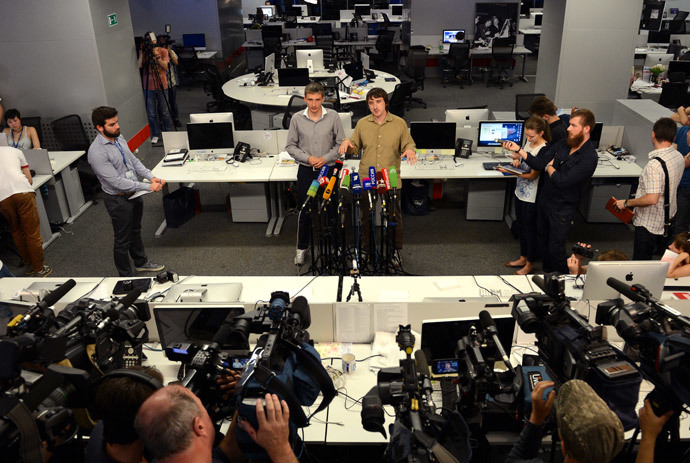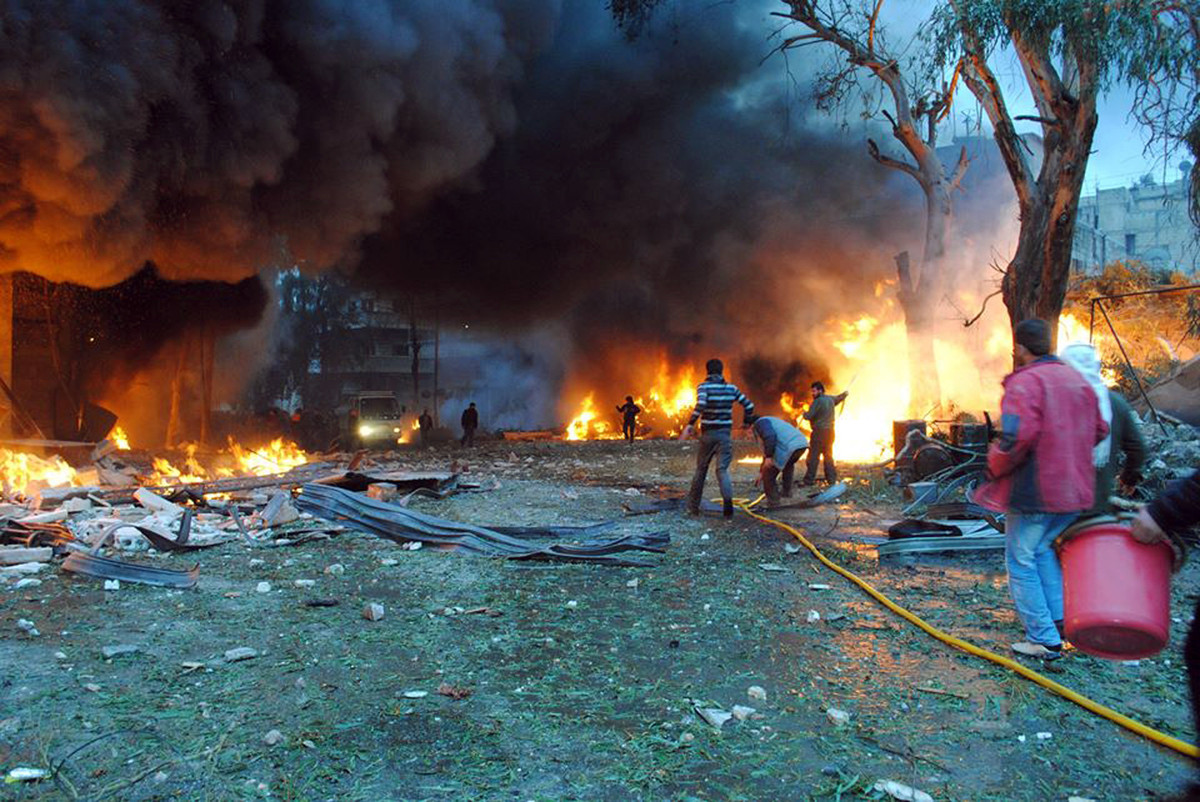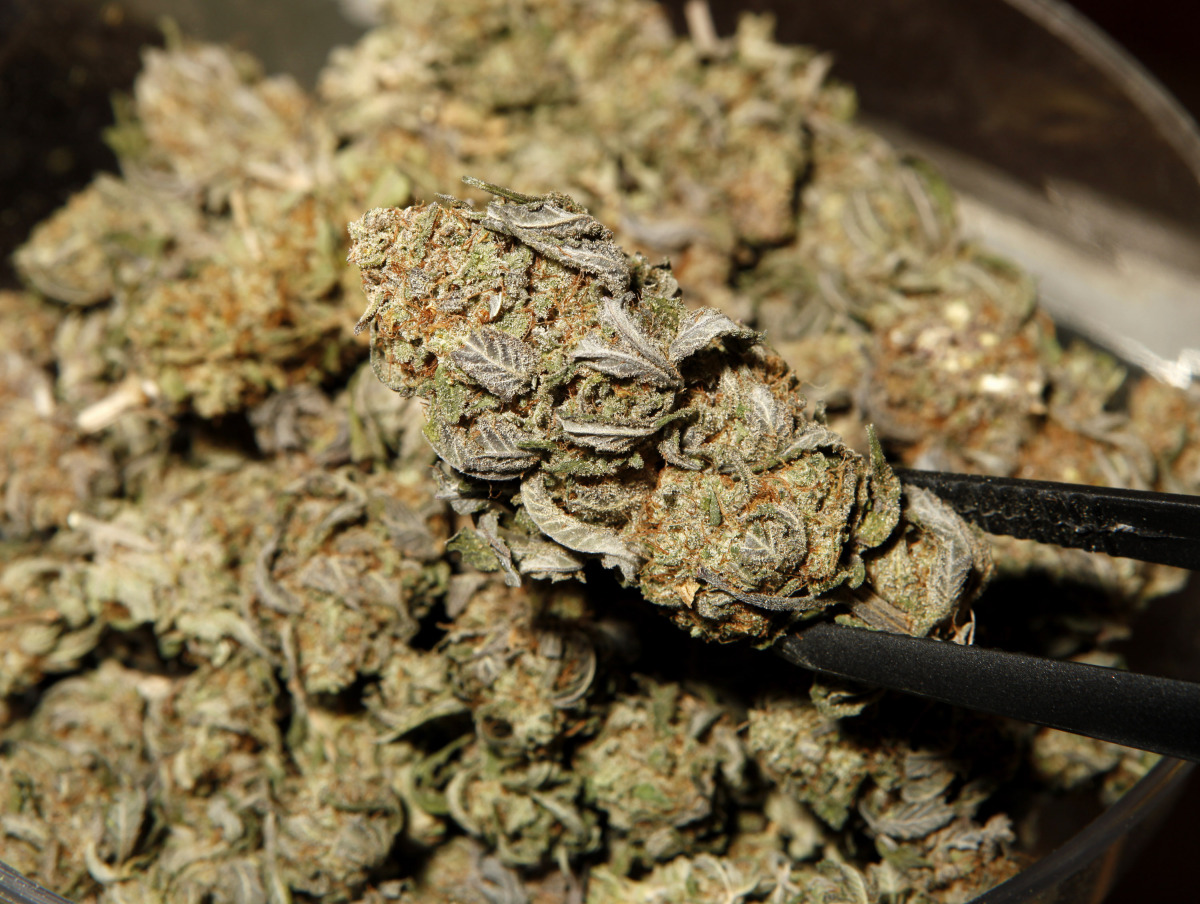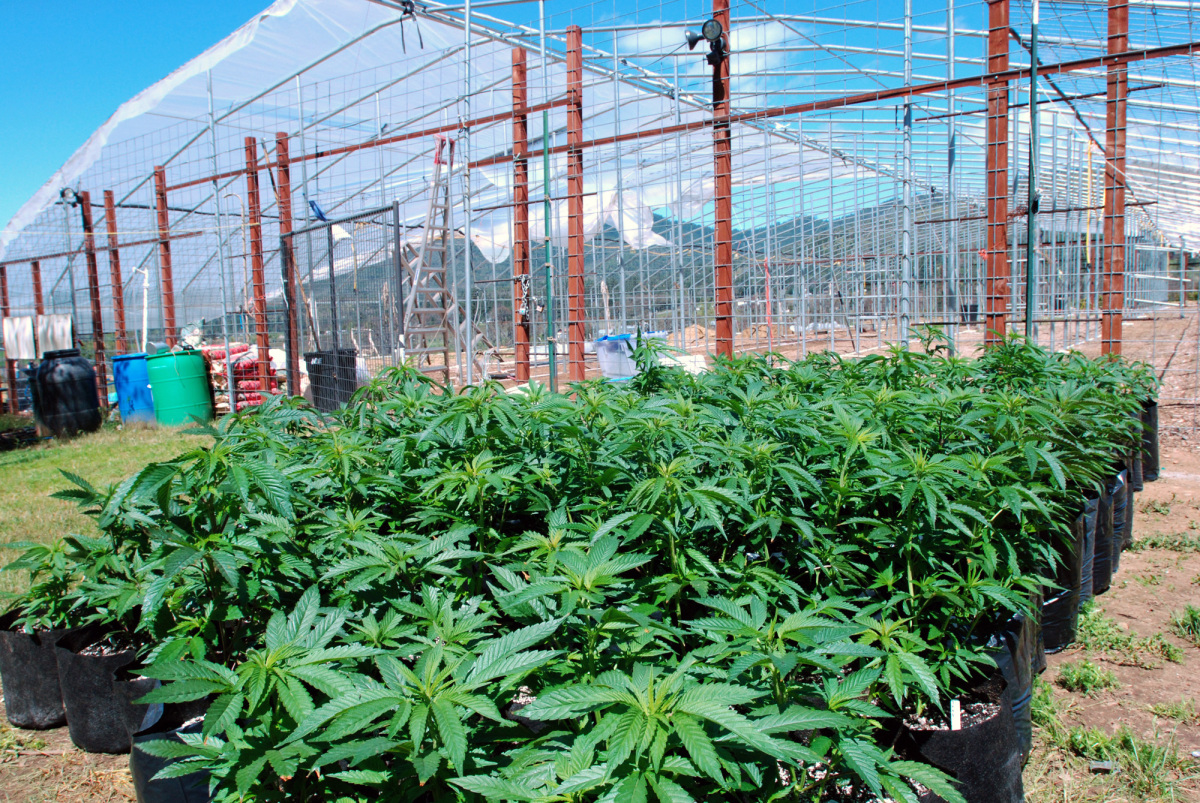Self-proclaimed Donetsk and Lugansk republics form ‘Novorossiya’ union
Self-proclaimed Donetsk and Lugansk People’s Republics which recently held referenda on independence from Ukraine have declared the creation of Novorossiya union.
“We have signed a memorandum on the union,” Denis Pushilin, co-chairman of the Donetsk People’s Republic, told the media.
The new union will be called Novorossiya, said the people’s governor of the Donetsk Region, Pavel Gubarev.
He added that the document was signed in the city of Donetsk by Donetsk People’s Republic Prime Minister Aleksandr Borodai and the head of Lugansk People’s Republic Aleksey Karyakin.
People’s representatives from eight Ukrainian regions gathered for a congress in Donetsk on Saturday, a day ahead of scheduled countrywide presidential elections.
As a result of the congress, the south-eastern regions of Ukraine, where anti-government protests gained momentum, have announced the creation of a pro-federalization Popular Front socio-political coalition. The movement accepted a manifesto vowing self-determination and protection of people from “Nazi gangs’ terror.”
The coalition involves Odessa, Nikolaev, Dnepropetrovsk, Zaporozhye, Kharkov, Kherson, Donetsk and Lugansk Regions.
At the congress, all 145 delegates accepted the manifesto, which stresses that the Popular Front will consist of “everybody, who is ready to resist self-appointed Kiev authority, which started war against the people.”
The coalition vowed to protect innocent civilians from the “terror of Nazi gangs, financed by oligarchs and foreign security services.” It also pledges “a joint fight for people’s rights to a decent life.”
It says it has launched an investigative commission that will probe “crimes of Nazi-terrorists and their Kiev patrons”.
The coalition is calling for a boycott of the presidential election, which is scheduled to take place on Sunday, because “all major candidates” are “oligarchs, whom we have already seen in top positions, hence, robbery and terror would continue,” the manifesto said.
When it comes to a new Ukrainian constitution, the Popular Front demands that it guarantees “neutrality” and nonparticipation in military blocks as well as “political independence”, “mechanisms to stop corruption and massive poverty.”
The coalition also demands that the parliament consists of two chambers. At the same time, regions must be given “a right to autonomy” and “independent foreign-economic activity”.
In addition to that, regional governments must be given a right to “announce its territory de-militarized zones and also “ban political, social and religious organizations on its territory” in case they are considered a “threat” to the people.
The Popular Front wants two official languages in Ukraine – Ukrainian and Russian.
Lugansk and Donetsk People’s Republics earlier announced they will not participate in Ukraine’s presidential elections scheduled for May 25.
'Vote at gunpoint,' anyone? US keen to legitimize 'good' election in Ukraine
US senators Rob Portman (R-Ohio) and Benjamin Cardin (D-Maryland) arrived in Ukraine’s capital Kiev as a part of the American monitoring mission. The US team is led by former Secretary of State, Madeleine Albright.
Ahead on Sunday’s voting, Maryland Democratic Senator Benjamin Cardin emphasized Washington’s backing for the vote.
“Our main reason for participating is to express our support for the Ukrainian people,” Cardin told a news conference in Kiev. The American lawmaker added that they were “particularly concerned about the impact from Russia” and would “obviously be watching closely what happens tomorrow.”
Speaking with MSNBC Saturday, Cardin also suggested that “they would see record numbers coming out to vote”.
Ohio’s Republican Robert Portman told MSNBC he thought the election would be “good,” admitting though that voter turnout in two eastern Ukrainian regions might not be as high as they “hoped for.”
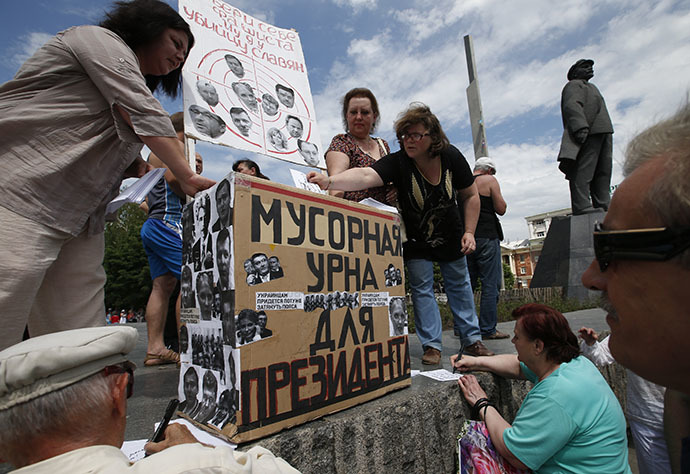
Previously - under different circumstances - American officials could say how unacceptable voting at gunpoint is.
“That is not something that can be done with the barrel of a gun pointed at you,” President Obama and said earlier this year, at a meeting with Ukraine’s acting Prime Minister Arseniy Yatsenyuk.
Kiev has unleashed the army against those in the east of Ukraine who don’t want to be under its control.
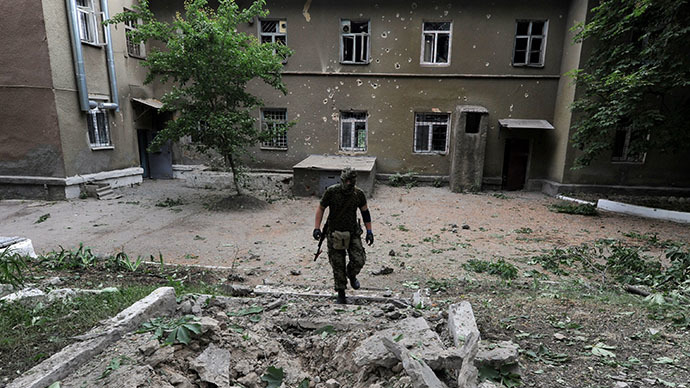
“Ukraine is ready for the election,” Marie Harf, deputy spokesperson at the State Department told a press briefing on Friday.
“Across the vast majority of Ukraine, things are calm,” Jen Psaki, the State Department’s spokesperson claimed earlier.
It was calm in the port city of Odessa on May 2, before pro-Kiev activists chased their opponents into a building, the Trade Unions House and set it on fire, killing over 40 people and injuring dozens more. To this day, no one has been held responsible.
Similarly, no one was held responsible for the violence on the streets of Kiev in February which resulted in a coup that ousted President Viktor Yanukovich and propelled to power those whom the US wanted to see.
“It was absolutely vital for the political establishment in the US to legitimize the government that was installed by the Maidan coup in February because then they can say ‘Oh, look! These people were democratically elected.’ Because until now they haven’t been democratically elected: they came to power through force,” Nebojsa Malic, a columnist at antiwar.com told RT.
Thousands of international observers have been sent to Ukraine to observe the elections.
The OSCE sent its monitors to nine regions “according to a plan,” Richard Solash, a representative of the mission told Itar-Tass. However, no observers were present in Donetsk and Lugansk – the regions in eastern Ukraine that have been in the epicenter of anti-Kiev protests. Ahead of the voting day, four members of the OSCE team visited Donetsk to see what the situation was like, following which it was decided not to allocate observers to the region as well as to neighboring Lugansk.
The Ukrainian Interior Minister had admitted earlier that it would not be possible to hold elections in a number of districts in both Lugansk and Donetsk regions.
“We are fully aware…that it will no longer be possible to hold in a normal way elections on the vast territory of Donesk and Lugansk regions,” Arsen Avakov told a media conference.
That does not change anything for the coup-imposed government in Kiev who amended the election bill to remove the minimum turnout requirement.
Meanwhile, violent confrontation between Kiev and its opponents continued on election day, with shooting being reported in the Lugansk region. One person was killed and another one wounded in a shootout at a polling station in the town of Novoaydar, according to the Deputy Head of Ukraine’s Interior Ministry.
Reportedly, a column of Ukrainian National Guard armored vehicles managed to break through the protesters’ defense and was heading to Lugansk. The Kiev forces opened fire at civilians in a café in the town, an authority from the self-proclaimed People’s Republic of Lugansk told RIA Novosti. “A man and a woman were killed,” the source said, adding that several people were wounded.
But the West seems to feel ok with part of Ukraine being under gunpoint.
'Kept in dug-out, tied up with sacks on heads': Russian journos on Ukraine detention
Two Russian journalists held in detention in Ukraine for several days say they were kept in a dug-out cell with sacks on their heads, their hands and legs tied. They claim their lives were also threatened.
It all started when the two moved towards the airport near Kramatorsk to check the information provided by the locals that the Ukrainian forces had left it.
“Next to the airport, we ended up being at gunpoint by Ukrainian law enforcement officials. We raised our hands and shouted that we are journalists,” cameraman Saichenko said.
About 12 people jumped from two armored vehicles and opened fire over the journalists’ heads. They were surrounded, searched, pushed in to the armored vehicle. The military men also took their belongings.
No reasons were given for their detention, everyone just “kept poking at them with machine guns,” Sidyakin said.
“We told them we’re journalists, that we had no weapons, that we were on an official mission from our editors. But they weren’t convinced. In an hour we were pushed in the same armored vehicles and took to a field, and then loaded us into helicopters. When we arrived, we were forced to keep our heads close to the ground not to see anyone’s faces… In response to our requests to call someone, we were hit on the head,” Sidyakin added.
The journalists also said that initially, they were given “no food at all, only gave us some water overnight.”
“While we were waiting for the helicopter, we were shown an ‘Igla’ [needle] MANPAD [Man-Portable Air Defense] and told that we were Russians, and that is a Russian weapon. When they were loading us into the helicopter, they also took that weapon. All the military men were sure that they had caught separatists and terrorists who had this thing with them,” Saichenko continued.
“During the questioning, they used some ointment that was supposed to lead to some result. But there was none, so they got angry,” Sidyakin said.
“The guards told us that we would be shot down by dawn anyway, and asked us to take off our trainers so that they could have them [while they were still] clean,” Saichenko said.
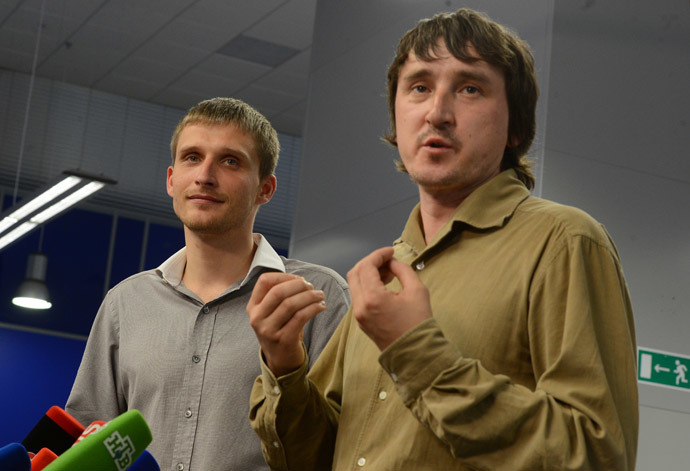
The journalists said that the military men wanted them to admit that the weapon had been in their possession.
“They were trying to force us to confess that it was our MANPAD… We didn’t take any weapons in our hands, even ammunition, as it contradicts our profession,” Sidyakin said.
When asked what kind of people they saw during their detention, the journalists stressed that the contingent was most diverse at the airport.
“There were many mercenaries. There were people in uniforms uncharacteristic for Ukraine. They didn’t speak with anyone, just silently entered the HQ. It remains a mystery to us who they were.”
Despite not having heard anything spoken in English, Sidyakin said there were many people “uniformed and equipped Western-style, their behavior was strange, and so was their demeanor and the fact they weren’t talking to anyone.”
Saichenko remarked that, in his opinion, the Ukrainian army has a very disconnected structure.
“Having spent some time within the Ukrainian army and felt what it’s like, we understood that it is a very divided body. Many conscripts, including those who guarded us, complained that they should have been fired a long time ago, but haven’t been dismissed up to that moment. They complained about the quality of food,” Saichenko said.
“A young man who used to romanticize Maidan [the heart of the Kiev protest earlier in the year] was among them and he told us that now “he understands what he was caught up in…” Saichenko added.
Earlier, Saichenko said that Ukrainian law enforcement officials threatened to kill him and his colleague, reporter Oleg Sidyakin, and did everything possible to make the two would believe in the seriousness of their intentions.
Their hands were tied behind their backs, their legs were taped up, and sacks were put on their heads. The sacks were also taped up on their necks, so it was barely possible to breathe.
“My state was close to madness, it was very bad. I was hit on the head and kicked into the groin a couple of times, but I would prefer being beaten to the way we were held in that hole,” Saichenko said.
Saichenko also said that despite the hate, there was always room for hope.
“We were surrounded by hatred. Our guards believed that we were terrorists. I was told that I could be taken to the toilet and shot dead because I supposedly was trying to escape. We spent two days in that dug-out cell, and then four days in a closed room. But we still understood that we would be fought for, that our case would make it to the top. We were certain that President Putin and other leaders would fight for us,” he said.
Despite everything they’ve been through, Sidyakin and Saichenko are leaving the possibility that they will go to Ukraine to cover events there open, if the channel’s leadership approves their work trip – but not because they’re daredevils.
“I’ve always justified my presence in such places with the idea that I need to show that war is bad, that it’s suffering, death,” Saichenko stressed.
He says they signed a document which said that they, as LifeNews journalists, “pledge not to inflict any harm on Ukraine and the Ukrainian people.”
“We were surrounded by hatred. Our guards believed that we were terrorists. I was told that I could be taken to the toilet and shot dead because I supposedly was trying to escape. We spent two days in that dug-out cell, and then four days in a closed room. But we still understood that we would be fought for, that our case would make it to the top. We were certain that President Putin and other leaders would fight for us,” he said.
Despite everything they’ve been through, Sidyakin and Saichenko are leaving the possibility that they will go to Ukraine to cover events there open, if the channel’s leadership approves their work trip – but not because they’re daredevils.
“I’ve always justified my presence in such places with the idea that I need to show that war is bad, that it’s suffering, death,” Saichenko stressed.
He says they signed a document which said that they, as LifeNews journalists, “pledge not to inflict any harm on Ukraine and the Ukrainian people.”
The Russian journalists for LifeNews TV channel were captured by Kiev forces near the eastern city of Kramatorsk a week ago.
They were being investigated on charges of “aiding terrorist groups,” according to Kiev authorities, who refused to give any information about their location and denied a special observer mission access to the journalists.
The accusations of illegally transporting weapons and aiding terrorism against Russian journalists are “nonsense and delirium,” President Putin said earlier, calling the situation “unacceptable” and warning that Kiev’s crackdown on reporters working in Ukraine will affect Moscow’s relations with the “new Ukrainian authorities.”
Today’s Ukraine election means there will be no war with Russia
The
main message of today’s presidential election in Ukraine is that war
with Russia is off the table—at least for now. Russia and Ukrainian
separatists tried hard to prevent the vote—and succeeded in swaths of eastern Ukraine—but now that the election has gone ahead, they will turn to other tactics to press their views.
+
Yet Ukraine’s new leadership faces other gargantuan challenges, including a decision yesterday by two of its most important industrial regions to combine in their own “people’s republic” called Novorossiya.
+
Russian president Vladimir Putin’s softer rhetoric suggests that he is prepared to at least hear out Petro Poroshenko, a chocolate magnate who, an exit poll predicts, will emerge the outright winner.
If the polls are wrong and Poroshenko fails to win 50% of the vote, he
will face the candidate with the second most votes in a June 15 runoff.
+
A
president Poroshenko is likely to assure Putin, probably in private,
that Kyiv has no current plans to join NATO, which is the Russian
leader’s main demand. But, as ousted president Viktor Yanukovych found out
in the months preceding his flight in February, it would be political
suicide for him to explicitly foreswear a formal link to the West. Putin
understands local Ukrainian politics and, as long as he perceives no
overt anti-Russian hostility and sees a partner with whom he can do
business, he is likely to give Poroshenko a go.
+
Being a pragmatist (paywall),
that is precisely the face that Poroshenko is likely to present to
Putin. In other words, Poroshenko is likely to try to take control of a narrative that has turned long-conflicting west and east Ukraine into bitter and violent combatants.
+
But the challenges are many for Poroshenko, the Wilson Center’s Matthew Rojansky told Quartz.
+
Right this moment on the Maidan are still very serious, armed people who say they will stay and they will fight to ensure there is “concrete change” in Ukraine. So the next president and the former opposition—now acting authorities—really have to deliver a transformation of the country if they don’t want to face their own Maidan justice. It’s a rock-and-a-hard place problem given that they also have to come to some terms with the former regional party people, separatists, [the] scared population of Donbass [region in eastern Ukraine], and Russia itself.+
Putin
is unlikely to take Poroshenko’s feet out of the fire by withdrawing
Russia’s covert support for the eastern Ukraine uprising. To make
progress, Poroshenko will have to apologize loud and clear for early
missteps, such as a February decision to repeal Russian-language rights (which was quickly reversed), and take other conciliatory actions.
+
He will never satisfy all but—along with the help of local oligarchs such as Rinat Akhmetov, who have helped keep the most extremist tendencies in the eastern regions under control—he may get enough support to keep those regions from seceding for the time being.
+
How Ukrainian arms-dealing connects to Syria’s bloody civil war
All
the ingredients are there for a proper arms deal: A former government
official with connections to the military-industrial complex. A
stockpile of Soviet arms in Ukraine. Soldiers in Syria with a yen for
ammo and cash to burn. The biggest problem? Getting the arms from
eastern Europe to the battleground without alerting international
authorities or tipping off your enemies.
+
The story isn’t about Russia or the United States. It’s about Russia and the United States.
+
This week, the Wall Street Journal shone a light (paywall) on
one American’s thwarted effort to run guns into Syria for the
anti-regime Free Syrian Army. Last fall, analysts at the Center for
Advanced Defense Studies (C4ADS) in Washington assembled public data to identify a network of businesses (pdf)
in Ukraine and Russia at the heart of Russia’s efforts to arm the
Syrian regime. The two stories have a lot in common, with a key
difference being that Russia’s government is a lot more invested in
arming its side of the conflict.
+
The guns of Odessa
While
weapons of all kinds have cropped up throughout the Syrian conflict,
from the chemical weapons that made president Bashar Al-Assad an
international pariah to homemade rockets,
the rebels have two main problems: Getting enough rifles and ammunition
to give them a basic infantry force, and—the bigger problem—countering
the regime’s vast military advantage, especially as it has aircraft and
the rebels don’t.
+
Many weapons in the conflict hail from the former eastern bloc, according to surveys of small arms in Syria (pdf)
that are admittedly unscientific. There’s a reason for this: The Soviet
Union cranked up a massive arms machine, and when it collapsed, the
combination of chaos, weapons stockpiles and criminal entrepreneurship
gave men like Viktor Bout and Leonard Minin careers as arms dealers.
+
When it comes to recent arms deals to Syria, though, the C4ADS analysis sees a a new evolution in arms transit.
+
Using
software developed by Palantir, the secretive Silicon Valley big-data
firm, C4ADS tracked an interconnected network of businesses, often
hidden behind shell companies, who handle most Russian arms shipments.
The “Odessa network” it describes is centered on politically-connected
Russian and Ukrainian businessmen and the Ukrainian seaport of
Oktyabrsk, a former Soviet military base. At least 10 ships in the
network visited Syria in 2012, while dozens of Syrian vessels have
traveled back and forth to Oktyabrsk, according to C4ADS.
+
The
most prominent firm discussed is the Kaalbye shipping group. It was
founded by Igor Urbansky, a former Soviet naval captain who was
a Ukrainian government deputy minister from 2006 to 2009, and Boris
Kogan, whose business connections tie him to Russia’s defense industry.
Kaalbye-operated vessels have shipped all kinds of cargo, but they have
also have an important business transporting weapons to conflict zones
on Russia’s behalf.
+
At least one of Kaalbye’s ships, the Ocean Voyager, took a
shipment from Russia’s arms export agency to Syria’s ministry of
defense in 2012, according to a cargo manifest obtained by C4ADS. The
manifest (below) lists the contents of the shipment as only “equipment.”
Kaalbye’s representatives at the law firm Patton Boggs declined to
comment to Quartz, but the company has acknowledged this delivery to
Syria and says it is the only one that occurred that year.
+

A cargo manifest detailing the shipment of “equipment” from Russia’s arms export agency to Syria’s defense ministry.
The
C4ADS report also notes that other Kaalbye vessels dropped out of sight
of global ship-tracking databases at the same time that Russia
increased weapons deliveries to Syrian ports in 2012 and 2013. While
it’s possible that this is a coincidence, and the innocuous product of
less-than-perfect infrastructure, C4ADS suggests the timeline could
point to Kaalbye ships shutting off transceivers while making weapons
deliveries.
+
It’s
likely not illegal for Russian ships to deliver such cargos, depending
on the jurisdictions they pass through en route. But delivering weapons
to Syria would violate Western sanctions. Kaalbye, presumably concerned
that other lines of business—including potential US government
contracts—might be affected by the C4ADS allegations, threatened to sue
the think tank for defamation and hired a public relations firm to
challenge its findings. Kaalbye also provided evidence to the Washington Post that one of the missing ships was in fact using its tracking system and did not stop in Syria.
+
But in April, the think tank preemptively sued the shipping firm for interfering in its business. The back and forth between the company’s American representatives and C4ADS is a saga in itself, and more may be revealed in early June, when Kaalbye must respond to the suit in court.
+
Kaalbye’s
role aside, Western intelligence agencies are confident that Russian
(and, to a lesser extent, Iranian) supplies—from helicopters to tanks to
ammunition and diesel—have allowed the Assad regime to wage war despite
not having much of an industrial base or support from other nations.
+
This
analysis of Russia’s arms shipment logistics also, incidentally, helps
explain president Vladimir Putin’s interest in influencing or annexing
eastern Ukraine. Yes, it’s a former part of the Soviet empire where a
lot of ethnic Russians live; but it’s also vital infrastructure for
Russia’s efforts to project power abroad today—and a profit center for the Russian defense industry.
+
And
that’s why it’s interesting that a stockpile of weapons a group of
Americans sought to provide to Syrian rebels also hails from Ukraine.
+
There’s something about Schmitz
About a year ago, according to the Journal’s story, a
former US defense department official named Joseph Schmitz approached
the leader of the rebel Free Syrian Army. He offered to give them 70,000
assault rifles from Ukraine and 21 million rounds of ammunition, for
which an unnamed Saudi prince would foot the bill. Given that the
fighting force of the Syrian rebels is estimated at perhaps 100,000
strong, it would have been a substantial injection of firepower—though
it would not solve the air superiority problem. At the time, the US
government was dithering over whether to provide much in the way of
weapons at all, given the risks that they might reach anti-American
groups or fail to change the dynamics of the conflict.
+
Schmitz, who had worked as the independent auditor for the US Defense Department, left that job in 2005 after coming under Congressional criticism
for close relationships to contractors he supervised; no wrong-doing
was ever identified. He became the the general counsel for Blackwater,
the notorious US mercenary firm, before going into private practice as
an attorney. Last year, the Journal reports, he somehow arose as the
middleman between the unnamed Saudi benefactor, two unnamed US weapons
brokers, and whoever owned those weapons and the capacity to transport
them to Syria.
+
This
all came to a halt, according to the Journal, when a US spy in Jordan
apparently told one of Schmitz’s partners that the US government didn’t
want any freelance arms dealing in Syria. This was before Schmitz had
applied to the State Department for an official license to broker such
weapons sales overseas, which he said he intended to do all along,
though both arms trafficking experts and members of the Syrian
opposition were skeptical of his approach. Soon, evidence that Syria had
used chemical weapons against civilians in rebel-held areas loosened US
restrictions. Now, the US is directly supplying training
and an unknown amount of small arms and anti-tank weapons to select
Syrian rebels across the border from Jordan—but still no anti-aircraft
missiles.
+
How much do weapons cost?
The more the war in Syria drags on, the higher the demand for weapons. Here’s a chart from the Small Arms Survey (pdf) looking at the correlation between increases in casualties and the cost of weapons:
+

In 2012, rebels seeking armaments in Turkey found that just one cartridge for a machine gun or assault rifle
cost $2-$4, while a common assault rifle cost upward of $2,000. That
puts some perspective on the value of Schmitz’s offer; at those prices,
that much weaponry would have cost the rebels perhaps a quarter of a
billion dollars. Presumably, the wholesale cost to Schmitz’s group would
have run cheaper.
+
But
those numbers also underscore that the conflict can be a boon for
defense contractors. Russia exported some $17.6 billion in weapons in
2012 alone, and that’s just the arms transfers it reports; even if the
government is underwriting most of those costs, it’s still promoting its
industrial base. When it comes to arms sales, the US is it’s only
rival, exporting perhaps $60 billion worth of
military goods in 2012, although that’s an unusually high number driven
by advance sales. Here’s a more representative picture of the global
arms market:
+

What’s
most worrisome is that these data are mostly focused on large
armaments—planes, tanks, ships and bombs—and not small arms. While the
dangers of mechanized inter-state warfare are well known, small-arms
trafficking is harder to spot, and that has people worried, since
it increasingly fuels destabilizing conflicts from Africa to Latin
America. Last year, the UN passed a treaty
in part designed to create more transparency around arms trading and
urge countries not to send weapons knowingly to places where they’re
likely to be used in genocide, terrorism, and the like. The US has
signed the treaty; Russia has not.
+
As
the world’s top arms dealers square off in Syria, the situation looks
to be approaching a stalemate. Fractured rebel groups retreating in the
face of pressure from a regime confident in its ability to consolidate power
and wait its enemies out. That’s not likely to change unless the US or
someone else decides to send anti-aircraft weapons to the rebels. But as
long as the steady migration of weaponry from eastern Europe to the
Middle East continues, the suffering isn’t liable to stop anytime
soon—the latest count by activists attempting to track the disaster is
is that more than 160,000 people have been killed,
and many more have been turned into refugees, with the UN claiming that
Lebanon alone will hold 1.5 million by the end of the year.
State Duma factions welcome Ukraine referendum results
The results of the Sunday referendums in Ukraine’s Donetsk and Lugansk regions prove that their residents are seeking freedom and protection for their infringed rights, say the leaders of all four Russian parliamentary factions.
The head of the State Duma committee for relations with the Commonwealth of Independent States (a Russia-led economic and political bloc where Ukraine was an observer member until mid-march this year), Leonid Slutsky, said Monday that the referendum only confirmed the information that Russian officials already possessed – that the overwhelming majority of people in Eastern and Southeastern Ukraine were opposing the Kiev regime and the forced union with the West. Slutskiy added that the poll results will be taken into consideration as Russia develops its new relations with Ukraine, but the major priorities of these relations will remain the same – stopping the bloodshed and prevent a humanitarian disaster.
The MP also noted that the Duma fully supported the position of President Vladimir Putin, who last week called upon the pro-federalization forces in Donetsk and Lugansk regions to postpone the referendums and try to negotiate with the Kiev regime into suspending the military operation against the civilian population in its own country. However, the decision to hold the referendum still must be respected as such a move is fully within the sovereign right of the Ukrainian territories, Slutskiy added.
The head of the majority United Russia faction, Duma speaker Sergey Naryshkin, said that the fact that Ukrainians were holding a referendum on federalization was a proof of their drive toward freedom. He added that the numerous statements that the referendums and their results were illegitimate do not mean that the referendums never took place and through these events millions of Ukrainians have expressed their opinion that the current Ukrainian state allowed the mass violation of their rights.
The Communist Party faction says that the Donetsk and Lugansk referendums allow the self-defense units in these regions to act on behalf of the people. Deputy Duma speaker Ivan Melnikov noted that the results of the polls were even more impressive considering the extremely difficult and tense conditions in which they were held.
“Such referendums are even more in line with the original referendum idea than those held by the state as these are real grassroots events,” Melnikov told reporters. ”If the share of those who support federalization is above 90 percent, it becomes a primary political factor that simply cannot be ignored,” he added, calling the event “an important signal flare for the fight of all southeast [Ukraine].”
The head of the center-left parliamentary party Fair Russia, Sergey Mironov, said that he expected the Russian authorities to take a “calm and carefully considered decision” on the referendum results, but added that this decision will not be in support of those “who want to dance to Kiev’s tune written across the ocean.”
Mironov said that his party was in solidarity with Ukrainians from Lugansk and Donetsk and respected their right to express their views.
The flamboyant chairman of the populist nationalist party LDPR, Vladimir Zhirinovsky, told reporters that he demanded that Russia recognize the Ukrainian referendum results and hoped that life in the Southeast Ukrainian regions would become better after this turning point. The politician said that it was for Ukrainians themselves to decide their fate, but called for Russia to help provide security and humanitarian aid in the troubled regions.
The weekend referendums in the Donetsk and Lugansk regions have showed that the majority of voters support self-rule, according to the official results announced Monday.
Almost 90 percent of voters in the Donetsk region have endorsed political independence from Kiev and the number of supporters of self-rule in Lugansk was slightly over 96 percent, according to local activists who organized the polls.
Ukraine crisis: Vote outcome must be applied - Russia
Russia has called for
implementation of the result of the controversial referendums organised
by pro-Russian groups in eastern Ukraine.
Ukraine says the Sunday votes on self-rule are "a farce" with no legal basis. Russia has called for dialogue between the militants and Kiev with the participation of the Organisation for Security and Co-operation in Europe.
In Brussels, EU foreign ministers have expanded sanctions imposed as a result of Russia's actions in Ukraine.
Two Crimean companies and 13 individuals have
been added to the sanctions list - the names are likely to be announced
officially within the next 24 hours, reports the BBC's Chris Morris in
Brussels.
The sanctions impose travel bans and asset freezes. EU
ministers are also discussing what might trigger a broader package of
sanctions against the Russian economy.In a brief statement, the Kremlin described the referendums as "the will of the people" and noted the "high turnout".
The Kremlin denounced what it claimed had been "attempts to disrupt the votes, with the use of force, including the use of heavy weapons, against civilians", reports the BBC's Steve Rosenberg in Moscow.
The Russian authorities said they expected the results of the vote to be implemented in a civilised manner, without any repetition of violence and called for dialogue between Kiev, Donetsk and Luhansk.
Later Russia's Foreign Minister, Sergei Lavrov, said there were no plans to hold fresh international talks on the crisis - he accused the West of an "information blockade" over events in Ukraine and of "shameless lies".
German Foreign Minister Frank-Walter Steinmeier is to travel to Kiev on Tuesday to promote "dialogue" between the different parties.

Earlier, Ukraine's interim President Oleksandr Turchynov told Ukraine's parliament that "the farce that terrorist separatists call a referendum is nothing more than propaganda to cover up murders, kidnappings, violence and other serious crimes".
The EU and US also said the polls were illegal.
Separatists in the Donetsk and Luhansk regions say 89% and 96% respectively voted in favour of "self-rule".
A number of towns in the two eastern regions refused to hold the referendums.
They were held despite an earlier call for a delay by Russian President Vladimir Putin in order to create the conditions necessary for dialogue.



In other developments on polling day:
- BBC reporters said only a handful of polling stations served Mariupol, a city of half a million
- Anyone could vote in any polling station in the region simply by scribbling their name on a piece of paper, they say
- The BBC filmed a woman casting two ballots
Organisers also say they will boycott Ukraine's presidential elections on 25 May.
Russia annexed Ukraine's southern autonomous republic of Crimea after a March referendum.
Russia is estimated to have some 40,000 troops near the border and says they have been pulled back, but Nato says it has seen no sign of this.

55 al-Qaida militants reported dead in Yemen after US-backed air offensive
Interior ministry says prominent fighters among those killed in weekend campaign thought to have involved US drones
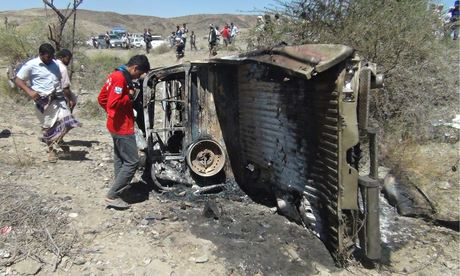
People inspect a car hit by an air strike in al-Bayda on Saturday which
the Yemeni government acknowledged had killed three civilians.
Photograph: Reuters
At least 55 al-Qaida militants have been killed in Yemen, the
country's interior ministry claimed after an intensive weekend air
offensive in which US drones are believed to have been involved.
The operation, which started on Sunday and continued into Monday, focused on a rugged mountain area in the central and southern provinces of Yemen, where al-Qaida has been operating camps.
Several air strikes – presumed to be carried out chiefly by US drones – were launched against targets in the Mahfad region, between Abyan, Shabwa and al-Bayda provinces.
The reported deaths of 55 militants on Sunday alone would make it the biggest strike against al-Qaida militants in years.
Yemen's interior ministry said that the first strikes on Sunday lasted for several hours and claimed the lives of three prominent figures as well as dozens of other militants. It identified the three as Mohammed Salem Abed Rabbo al-Mashibi, Fawaz Hussein al-Mahrak and Saleh Said Mahrak.
The ministry said that identification of the dead was continuing, and that non-Yemeni Arab fighters were among those killed.
It said the strikes hit targets in the valley of Wadi al-Khayala and two other locations, Lodiya and Ramtha, which local tribal leaders said were at either end of the valley.
The security officials and local tribal leaders said Monday's strikes killed several militants, including one they identified as a local commander, Munnaser al-Anbouri. It was unclear how many militants died. It was possible to identify him because militants delivered his body to his family, who live in the area, the officials said.
A tribal chief from the area said flames and smoke were billowing from the location on Sunday. He said the militants had been seen in the past parking their vehicles in bushes in the area and he believed the fire was caused by the vehicles' fuel tanks. In recent weeks, he said, the militants had transported heavy weaponry to the area, including artillery.
A Yemeni security official told the Associated Press that the infrastructure of the base had been destroyed. He said the offensive was based on intelligence and "regional and international" co-operation, suggesting that neighbouring Saudi Arabia may also have been involved in the planning. There was no immediate US comment on the strikes.
The escalation came after the Yemeni defence minister, Major General Mohammed Nasser Ahmed, and his commanders returned from the US after a two-week visit.
The Yemeni government acknowledged that three civilians were killed in the air strike on Saturday in the central al-Bayda province, which also witnessed a controversial strike in December in which security officials said 15 people on their way to a wedding were killed.
Also late on Sunday, a Yemeni security official said anti-terrorist forces had targeted a vehicle suspected of carrying al-Qaida operatives in Shabwa.
Shortly after, a helicopter arrived on the scene to pick up the bodies and those injured, local witnesses said, speaking on condition of anonymity for fear of retribution.
The operation, which started on Sunday and continued into Monday, focused on a rugged mountain area in the central and southern provinces of Yemen, where al-Qaida has been operating camps.
Several air strikes – presumed to be carried out chiefly by US drones – were launched against targets in the Mahfad region, between Abyan, Shabwa and al-Bayda provinces.
The reported deaths of 55 militants on Sunday alone would make it the biggest strike against al-Qaida militants in years.
Yemen's interior ministry said that the first strikes on Sunday lasted for several hours and claimed the lives of three prominent figures as well as dozens of other militants. It identified the three as Mohammed Salem Abed Rabbo al-Mashibi, Fawaz Hussein al-Mahrak and Saleh Said Mahrak.
The ministry said that identification of the dead was continuing, and that non-Yemeni Arab fighters were among those killed.
It said the strikes hit targets in the valley of Wadi al-Khayala and two other locations, Lodiya and Ramtha, which local tribal leaders said were at either end of the valley.
The security officials and local tribal leaders said Monday's strikes killed several militants, including one they identified as a local commander, Munnaser al-Anbouri. It was unclear how many militants died. It was possible to identify him because militants delivered his body to his family, who live in the area, the officials said.
A tribal chief from the area said flames and smoke were billowing from the location on Sunday. He said the militants had been seen in the past parking their vehicles in bushes in the area and he believed the fire was caused by the vehicles' fuel tanks. In recent weeks, he said, the militants had transported heavy weaponry to the area, including artillery.
A Yemeni security official told the Associated Press that the infrastructure of the base had been destroyed. He said the offensive was based on intelligence and "regional and international" co-operation, suggesting that neighbouring Saudi Arabia may also have been involved in the planning. There was no immediate US comment on the strikes.
The escalation came after the Yemeni defence minister, Major General Mohammed Nasser Ahmed, and his commanders returned from the US after a two-week visit.
The Yemeni government acknowledged that three civilians were killed in the air strike on Saturday in the central al-Bayda province, which also witnessed a controversial strike in December in which security officials said 15 people on their way to a wedding were killed.
Also late on Sunday, a Yemeni security official said anti-terrorist forces had targeted a vehicle suspected of carrying al-Qaida operatives in Shabwa.
Shortly after, a helicopter arrived on the scene to pick up the bodies and those injured, local witnesses said, speaking on condition of anonymity for fear of retribution.
Finland plane crash kills eight people
Three survivors being treated for minor injuries after accident on plane carrying parachutists
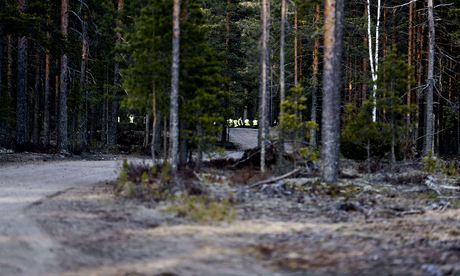
Rescuers search a forest after the accident in south-west Finland. Photograph: Mika Kanerva/AFP/Getty Images
Finnish officials say eight people died when a small plane carrying parachutists crashed to the ground and caught fire.
Det Supt Petri Kangas said three people survived the accident on Sunday after they parachuted from the aircraft above Jamijarvi airfield, about 70 km (45 miles) east of the southwestern town of Pori.
Kangas said investigators did not know the cause of the accident but that "apparently some parts fell off the plane before it crashed."
Police said the eight victims were found in the badly burned aircraft, a Comp Air 8 kit aircraft, popular among parachutists, and that the three survivors were being treated for minor injuries.
Det Supt Petri Kangas said three people survived the accident on Sunday after they parachuted from the aircraft above Jamijarvi airfield, about 70 km (45 miles) east of the southwestern town of Pori.
Kangas said investigators did not know the cause of the accident but that "apparently some parts fell off the plane before it crashed."
Police said the eight victims were found in the badly burned aircraft, a Comp Air 8 kit aircraft, popular among parachutists, and that the three survivors were being treated for minor injuries.
Syria sets June election date as Assad claims 'turning point' in conflict
Opposition calls presidential poll a 'parody of democracy' and says vote will wreck efforts to negotiate peace settlement
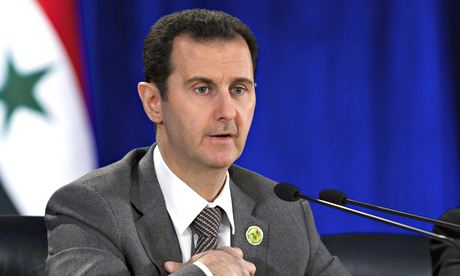
Bashar al-Assad has not said whether he will stand for election but
allies have predicted he will participate and win. Photograph:
Sana/Reuters
Syria has called a presidential election for 3 June, preparing the ground for Bashar al-Assad to defy widespread opposition and extend his grip on power days after he said the war was turning in his favour.
The three-year-old rebellion against Assad's rule has killed more than 150,000 people, forced millions to flee their homes and seen the government lose control over swaths of territory. Hundreds more died on Sunday and Monday.
A leading Syrian opposition group said the election showed the president was divorced from reality.
Western and Gulf Arab countries that back Assad's opponents had called plans for the vote a "parody of democracy" and said it would wreck efforts to negotiate a peace settlement.
United Nations-backed talks in Geneva collapsed in February with both sides far from agreement – not least over the question of whether Assad should step down. No date has been set for their resumption.
Monzer Akbik, chief of staff of the president's office of the main western-backed National Coalition opposition group, told Reuters the election was a sign Assad was unwilling to co-operate on finding a political solution to the conflict.
"This is a state of separation from reality, a state of denial. He didn't have any legitimacy before this theatrical election and he will not after," he said. "We do not know what actor he is putting up as an opponent but we are not taking this seriously."
Infighting has fragmented the anti-Assad forces during the conflict, and several major opposition figures have not attended the Geneva talks.
Assad has not said whether he will stand again, but his allies in Russia and in Lebanon's Hezbollah Shia movement have predicted he will participate and win.
In state-controlled parts of the Syrian capital, Damascus, preparations for Assad's candidacy have already begun.
Announcing the election on state television, the parliamentary speaker, Mohamed Jihad al-Laham, said requests for nomination would be accepted until 1 May. Voting for Syrians outside the country would take place at Syrian embassies on 28 May, he said.
Syria's parliament set residency rules for presidential candidates in March, a move that would bar many of Assad's foes who live in exile.
Assad said last week the conflict had reached a "turning point" due to his forces' military gains against the rebels.
The fighting has continued, with air strikes, gun battles and shelling reported on Monday across the country. The opposition Syrian Observatory for Human Rights put Sunday's death toll at 273, including dozens in air strikes on the northern city of Aleppo. Fighting killed dozens more early on Monday.
The three-year-old rebellion against Assad's rule has killed more than 150,000 people, forced millions to flee their homes and seen the government lose control over swaths of territory. Hundreds more died on Sunday and Monday.
A leading Syrian opposition group said the election showed the president was divorced from reality.
Western and Gulf Arab countries that back Assad's opponents had called plans for the vote a "parody of democracy" and said it would wreck efforts to negotiate a peace settlement.
United Nations-backed talks in Geneva collapsed in February with both sides far from agreement – not least over the question of whether Assad should step down. No date has been set for their resumption.
Monzer Akbik, chief of staff of the president's office of the main western-backed National Coalition opposition group, told Reuters the election was a sign Assad was unwilling to co-operate on finding a political solution to the conflict.
"This is a state of separation from reality, a state of denial. He didn't have any legitimacy before this theatrical election and he will not after," he said. "We do not know what actor he is putting up as an opponent but we are not taking this seriously."
Infighting has fragmented the anti-Assad forces during the conflict, and several major opposition figures have not attended the Geneva talks.
Assad has not said whether he will stand again, but his allies in Russia and in Lebanon's Hezbollah Shia movement have predicted he will participate and win.
In state-controlled parts of the Syrian capital, Damascus, preparations for Assad's candidacy have already begun.
Announcing the election on state television, the parliamentary speaker, Mohamed Jihad al-Laham, said requests for nomination would be accepted until 1 May. Voting for Syrians outside the country would take place at Syrian embassies on 28 May, he said.
Syria's parliament set residency rules for presidential candidates in March, a move that would bar many of Assad's foes who live in exile.
Assad said last week the conflict had reached a "turning point" due to his forces' military gains against the rebels.
The fighting has continued, with air strikes, gun battles and shelling reported on Monday across the country. The opposition Syrian Observatory for Human Rights put Sunday's death toll at 273, including dozens in air strikes on the northern city of Aleppo. Fighting killed dozens more early on Monday.
Pro-Ukraine activists defy harassment to rally in border town of Khartsyzk
US vice-president Joe Biden arrives in Kiev for largely symbolic visit as Russia hints it could send in troops
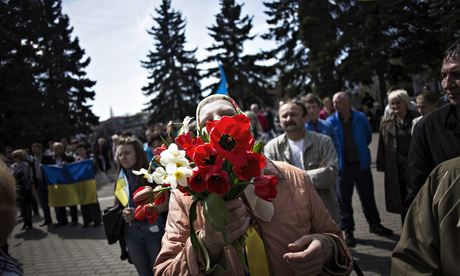
A woman holds a bouquet during a pro-Ukrainian rally in Khartsyzk, close
to the border with Russia,
on Monday. Photograph: Manu Brabo/AP
It was a classic political rally. There were emotional speeches,
flags and homemade banners. But the small middle-class crowd that
gathered on Monday in the eastern town of Khartsyzk, close to the border
with Russia, had turned up to support Ukraine. They waved
blue-and-yellow flags. They showed placards. One read: "Goodwill to
all". Another held aloft by two smiling white-haired ladies read: "Make
love not war."
Pro-Russian groups have seized a string of town halls across eastern Ukraine. They have occupied and barricaded the administration building in Khartsyzk, a town of 65,000 people 40km from Donetsk, and known for its giant tube factory. The separatists are demanding a referendum. They have proclaimed a "Donetsk people's republic" whose goals include separation from Kiev and – it appears – swift union with Russia.
The Kremlin, meanwhile, appears to be threatening to send in troops. On Monday Russia's foreign minister, Sergei Lavrov, accused the government in Kiev of violating a deal struck in Geneva last week under which illegal groups were supposed to give up their arms. Lavrov said Kiev had failed to protect ethnic Russians from far-right extremists. His comments follow a murky shoot-out over the weekend in the town of Slavyansk, occupied by angry anti-western gunmen.
The US vice-president, Joe Biden, arrived in Kiev on Monday for a two-day trip. He is due to meet the prime minister, Arseniy Yatsenyuk, and the president, Olexander Turchynov, on Tuesday. But with international attempts to de-escalate the crisis in Ukraine effectively shredded, Biden's visit appears largely symbolic. It takes place against a backdrop of ominous Kremlin rhetoric.
The pro-Ukrainians at the rally on Monday claimed that separatists in the east enjoyed only minority support. A majority in the Russian-speaking Donbass region were actually in favour of Ukrainian unity, they said. Peaceful residents regarded the appearance of "little green men" in Slavyansk – allegedly undercover Russian soldiers – with horror. So why were only about 200 people, a mixture of students, professionals and pedagogues, at Khartsyzk's pro-Ukraine rally?
"A lot of people here are frightened," Ludmilla Pogromskaya, a 53-year-old English teacher, answered. "Some of those who have seized our town hall are thugs. Others are being paid. They don't have a single political idea beyond referendum." Pogromskaya described Putin as "the aggressor" and said: "We want a decent society. We'd like an honest judicial system. Russia means crime and corruption."
There have been examples of civic activists who support Ukraine facing harassment and worse. On Sunday Slavyansk's militia kidnapped Irma Krat, a 29-year-old Kiev activist who was working in the town as a journalist. On Monday they seized three more reporters, two Italians and a Belarusian, later releasing them. The gunmen blindfolded Krat and paraded her on Russian television and outside the town hall. She said she was not being mistreated but has yet to be freed.
Separately, a mediator from the Organisation for Security and Co-operation in Europemet Slavyansk's self-appointed "people's mayor", Vyacheslav Ponomaryov.
The mediator asked whether the heavily armed rebels in the town would comply with the Geneva agreement and give up their weapons. The mayor's reply was not made public. But other separatists have said they have no intention of disarming.
Svitlana Oleinikova, who runs an NGO in the town of Torez, close to Khartsyzk, said it was becoming increasingly dangerous to express pro-Ukraine views. She said a teenage boy was badly beaten on Sunday for shouting "Glory to Ukraine" in a park.
Separatists had broken the windows of the Torez's progressive newspaper and tossed in a firebomb, she said. She added: "I don't call it the Donetsk people's republic. I call it the Donetsk Nazi republic. They're the fascists."
Olienikova said she too had received threats, delivered by phone and via the internet. She added that local mafia elements were exploiting the crisis to rob shops, including two chemists. "What frustrates me most is that the police don't do anything. There is an absence of authority. Neighbours accuse me of being a traitor. But how can I be be a traitor if I show my own flag?"
Monday's rally began with the Ukrainian national anthem, played out next to the town's statue of Lenin. Everybody sang. The organiser, local businessman Vyacheslav Redko, then invited people to speak. One teacher read a Ukrainian poem. Khartsyzk's mayor vanished on holiday eight days ago when separatists took over his building. Another local official, Igor Kolodey, was bold enough to address the modest crowd.
"Why isn't the Ukrainian flag flying from the town hall?" someone shouted at him.
"It's still up inside the offices. The Ukrainian trident is there too," he replied. There were boos. "I didn't take the flag down," he said. More boos.
"You steal money!" someone shouted.
"No I don't," he replied. "I've never stolen anything."
Alexander Gricay, an entrepreneur, was unimpressed by this. He described the town council as "corrupted and pro-Russian".
"Russia has artificially created this current crisis," Gricay declared. He said the Kremlin was trying to get revenge on the west after the departure of the president, Viktor Yanukovych, who fled to Russia in February. On Monday Yanukovych called on Kiev to pull its army out of eastern Ukraine and engage in "peaceful dialogue".
Speaking in Donetsk, Alexander Bukalov, the head of the human rights organisation Memorial, said rights campaigners were in a difficult situation. Pro-Russian feelings in the east were strong, he said, but that didn't translate as support for separatist positions. "It sounds a paradox. But a lot of people say: 'I support Russia but want to live in Ukraine.' What they mean is they want Russian money and Russian help."
Bukalov was gloomy about the prospect of a further Russian invasion of eastern Ukraine, with Moscow seemingly looking for a pretext to go to war. He said curious events on the ground – including scarcely believable "attacks" by Ukrainian fascists – appeared to be following a Kremlin script. "It's like watching theatre. This feels like a performance done for Russian TV," he observed.
He described the febrile Donbass region as a "splinter from the Soviet Union". Many people yearned for the paternalist certainties of Soviet life, he said.
"We need to free ourselves from the past. We need to move on from myths about Stalin and Putin." Was he an optimist? "I'm sure something good can be done here. But there may be tragedy first."
Pro-Russian groups have seized a string of town halls across eastern Ukraine. They have occupied and barricaded the administration building in Khartsyzk, a town of 65,000 people 40km from Donetsk, and known for its giant tube factory. The separatists are demanding a referendum. They have proclaimed a "Donetsk people's republic" whose goals include separation from Kiev and – it appears – swift union with Russia.
The Kremlin, meanwhile, appears to be threatening to send in troops. On Monday Russia's foreign minister, Sergei Lavrov, accused the government in Kiev of violating a deal struck in Geneva last week under which illegal groups were supposed to give up their arms. Lavrov said Kiev had failed to protect ethnic Russians from far-right extremists. His comments follow a murky shoot-out over the weekend in the town of Slavyansk, occupied by angry anti-western gunmen.
The US vice-president, Joe Biden, arrived in Kiev on Monday for a two-day trip. He is due to meet the prime minister, Arseniy Yatsenyuk, and the president, Olexander Turchynov, on Tuesday. But with international attempts to de-escalate the crisis in Ukraine effectively shredded, Biden's visit appears largely symbolic. It takes place against a backdrop of ominous Kremlin rhetoric.
The pro-Ukrainians at the rally on Monday claimed that separatists in the east enjoyed only minority support. A majority in the Russian-speaking Donbass region were actually in favour of Ukrainian unity, they said. Peaceful residents regarded the appearance of "little green men" in Slavyansk – allegedly undercover Russian soldiers – with horror. So why were only about 200 people, a mixture of students, professionals and pedagogues, at Khartsyzk's pro-Ukraine rally?
"A lot of people here are frightened," Ludmilla Pogromskaya, a 53-year-old English teacher, answered. "Some of those who have seized our town hall are thugs. Others are being paid. They don't have a single political idea beyond referendum." Pogromskaya described Putin as "the aggressor" and said: "We want a decent society. We'd like an honest judicial system. Russia means crime and corruption."
There have been examples of civic activists who support Ukraine facing harassment and worse. On Sunday Slavyansk's militia kidnapped Irma Krat, a 29-year-old Kiev activist who was working in the town as a journalist. On Monday they seized three more reporters, two Italians and a Belarusian, later releasing them. The gunmen blindfolded Krat and paraded her on Russian television and outside the town hall. She said she was not being mistreated but has yet to be freed.
Separately, a mediator from the Organisation for Security and Co-operation in Europemet Slavyansk's self-appointed "people's mayor", Vyacheslav Ponomaryov.
The mediator asked whether the heavily armed rebels in the town would comply with the Geneva agreement and give up their weapons. The mayor's reply was not made public. But other separatists have said they have no intention of disarming.
Svitlana Oleinikova, who runs an NGO in the town of Torez, close to Khartsyzk, said it was becoming increasingly dangerous to express pro-Ukraine views. She said a teenage boy was badly beaten on Sunday for shouting "Glory to Ukraine" in a park.
Separatists had broken the windows of the Torez's progressive newspaper and tossed in a firebomb, she said. She added: "I don't call it the Donetsk people's republic. I call it the Donetsk Nazi republic. They're the fascists."
Olienikova said she too had received threats, delivered by phone and via the internet. She added that local mafia elements were exploiting the crisis to rob shops, including two chemists. "What frustrates me most is that the police don't do anything. There is an absence of authority. Neighbours accuse me of being a traitor. But how can I be be a traitor if I show my own flag?"
Monday's rally began with the Ukrainian national anthem, played out next to the town's statue of Lenin. Everybody sang. The organiser, local businessman Vyacheslav Redko, then invited people to speak. One teacher read a Ukrainian poem. Khartsyzk's mayor vanished on holiday eight days ago when separatists took over his building. Another local official, Igor Kolodey, was bold enough to address the modest crowd.
"Why isn't the Ukrainian flag flying from the town hall?" someone shouted at him.
"It's still up inside the offices. The Ukrainian trident is there too," he replied. There were boos. "I didn't take the flag down," he said. More boos.
"You steal money!" someone shouted.
"No I don't," he replied. "I've never stolen anything."
Alexander Gricay, an entrepreneur, was unimpressed by this. He described the town council as "corrupted and pro-Russian".
"Russia has artificially created this current crisis," Gricay declared. He said the Kremlin was trying to get revenge on the west after the departure of the president, Viktor Yanukovych, who fled to Russia in February. On Monday Yanukovych called on Kiev to pull its army out of eastern Ukraine and engage in "peaceful dialogue".
Speaking in Donetsk, Alexander Bukalov, the head of the human rights organisation Memorial, said rights campaigners were in a difficult situation. Pro-Russian feelings in the east were strong, he said, but that didn't translate as support for separatist positions. "It sounds a paradox. But a lot of people say: 'I support Russia but want to live in Ukraine.' What they mean is they want Russian money and Russian help."
Bukalov was gloomy about the prospect of a further Russian invasion of eastern Ukraine, with Moscow seemingly looking for a pretext to go to war. He said curious events on the ground – including scarcely believable "attacks" by Ukrainian fascists – appeared to be following a Kremlin script. "It's like watching theatre. This feels like a performance done for Russian TV," he observed.
He described the febrile Donbass region as a "splinter from the Soviet Union". Many people yearned for the paternalist certainties of Soviet life, he said.
"We need to free ourselves from the past. We need to move on from myths about Stalin and Putin." Was he an optimist? "I'm sure something good can be done here. But there may be tragedy first."
Teenage stowaway survives flight over Pacific in jet wheel well
Boy escapes unharmed despite losing consciousness after hiding in freezing conditions on flight from California to Hawaii
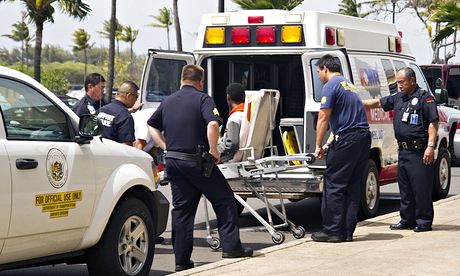
The boy is taken away in an ambulance at Kahului airport in Maui,
Hawaii, after stowing away in the wheel well of a flight from San Jose,
California. Photograph: Chris Sugidono/AP
A teenage runaway has survived a five-hour flight across the
Pacific Ocean from California to Hawaii stowed away in the freezing
wheel well of a jet plane.
Officials said it was a miracle the 16-year-old did not die after he lost consciousness as temperatures fell to -62C (-80F) in the compartment on flight.
He was found on the asphalt at Kahului airport in Maui, Hawaii, with no identification after jumping down and wandering around the grounds. His only possession, besides what he was wearing, was a comb.
Officials said he had run away from his family after an argument.
Security footage from the San Jose airport, where the flight originated, showed the boy jumping over a fence to get to Hawaiian Airlines flight 45 on Sunday.
"His story checked out," said FBI special agent Tom Simon. "It's just an apparent miracle … There was no appearance of any special gear of any sort. He was unconscious for the lion's share of the flight."
Simon said the boy was given a medical examinations and found to be unharmed. "[He] doesn't even remember the flight," he said. "It's amazing he survived that."
The boy, who will not be charged, has been referred to child protection services, Simon added.
Hawaiian Airlines said staff noticed the boy on the ramp after the flight arrived and notified airport security. "Our primary concern now is for the wellbeing of the boy, who is exceptionally lucky to have survived," it added.
In August, a 13- or 14-year-old boy in Nigeria survived a 35-minute trip in the wheel well of a domestic flight after stowing away. Authorities credited the flight's short duration with his survival.
Others stowing away in wheel wells have died, including a 16-year-old killed after stowing away on board a flight from Charlotte, North Carolina, to Boston in 2010 and a man who fell on to a suburban London street from a flight from Angola in 2012.
Officials said it was a miracle the 16-year-old did not die after he lost consciousness as temperatures fell to -62C (-80F) in the compartment on flight.
He was found on the asphalt at Kahului airport in Maui, Hawaii, with no identification after jumping down and wandering around the grounds. His only possession, besides what he was wearing, was a comb.
Officials said he had run away from his family after an argument.
Security footage from the San Jose airport, where the flight originated, showed the boy jumping over a fence to get to Hawaiian Airlines flight 45 on Sunday.
"His story checked out," said FBI special agent Tom Simon. "It's just an apparent miracle … There was no appearance of any special gear of any sort. He was unconscious for the lion's share of the flight."
Simon said the boy was given a medical examinations and found to be unharmed. "[He] doesn't even remember the flight," he said. "It's amazing he survived that."
The boy, who will not be charged, has been referred to child protection services, Simon added.
Hawaiian Airlines said staff noticed the boy on the ramp after the flight arrived and notified airport security. "Our primary concern now is for the wellbeing of the boy, who is exceptionally lucky to have survived," it added.
In August, a 13- or 14-year-old boy in Nigeria survived a 35-minute trip in the wheel well of a domestic flight after stowing away. Authorities credited the flight's short duration with his survival.
Others stowing away in wheel wells have died, including a 16-year-old killed after stowing away on board a flight from Charlotte, North Carolina, to Boston in 2010 and a man who fell on to a suburban London street from a flight from Angola in 2012.
NASA Cuts Most Ties With Russia's Space Agency Over Ukraine Crisis
NASA has been added to the list of U.S government agencies prohibited
from contacting Russian government representatives, though operation
of the International Space Station is exempt from the ban, officials
said on Wednesday.
"This suspension includes NASA
travel to Russia and visits by Russian government representatives to
NASA facilities, bilateral meetings, email, and teleconferences or
video conferences. At the present time, only operational
International Space Station activities have been excepted," NASA
Associate Administrator Michael O'Brien wrote in a memo to employees
that was posted on the NASAWatch.com website.
The
gesture may be largely symbolic. The only major space project under
direct U.S.-Russia control is the space station, a $100 billion
research laboratory, owned by 15 nations, which flies about 250 miles
(about 400 km) above Earth.
Three Russian cosmonauts, two U.S. astronauts and one Japanese astronaut currently are living aboard the orbital outpost.
"It's
not a major deal - and that's appropriate because space cooperation is
one of the few things that actually has gone relatively well with the
Russians," said Scott Pace, director of George Washington University's
Space Policy Institute.
"If we want to express our opposition to their actions I hope that we would choose other instruments," he added.
The sanctions stem from Russia's annexation of Ukraine's Crimea peninsula. (Editing by Eric Walsh)
________________________________
Syria Poison Gas Attack: Rebels, Government Blame Each Other
BEIRUT (AP) — Both sides in Syria's bloody civil war said Saturday that a rural village fell victim to a poison gas attack, an assault that reportedly injured scores of people amid an ongoing international effort to rid the country of chemical weapons.
But online videos posted by rebel activists from Kfar Zeita echoed earlier images that sparked a world outcry, showing pale-faced men, women and children gasping for breath at a field hospital. They suggest an affliction by some kind of poison — and yet another clouded incident where both sides blame each other in a conflict that activists say has killed more than 150,000 people with no end in sight.
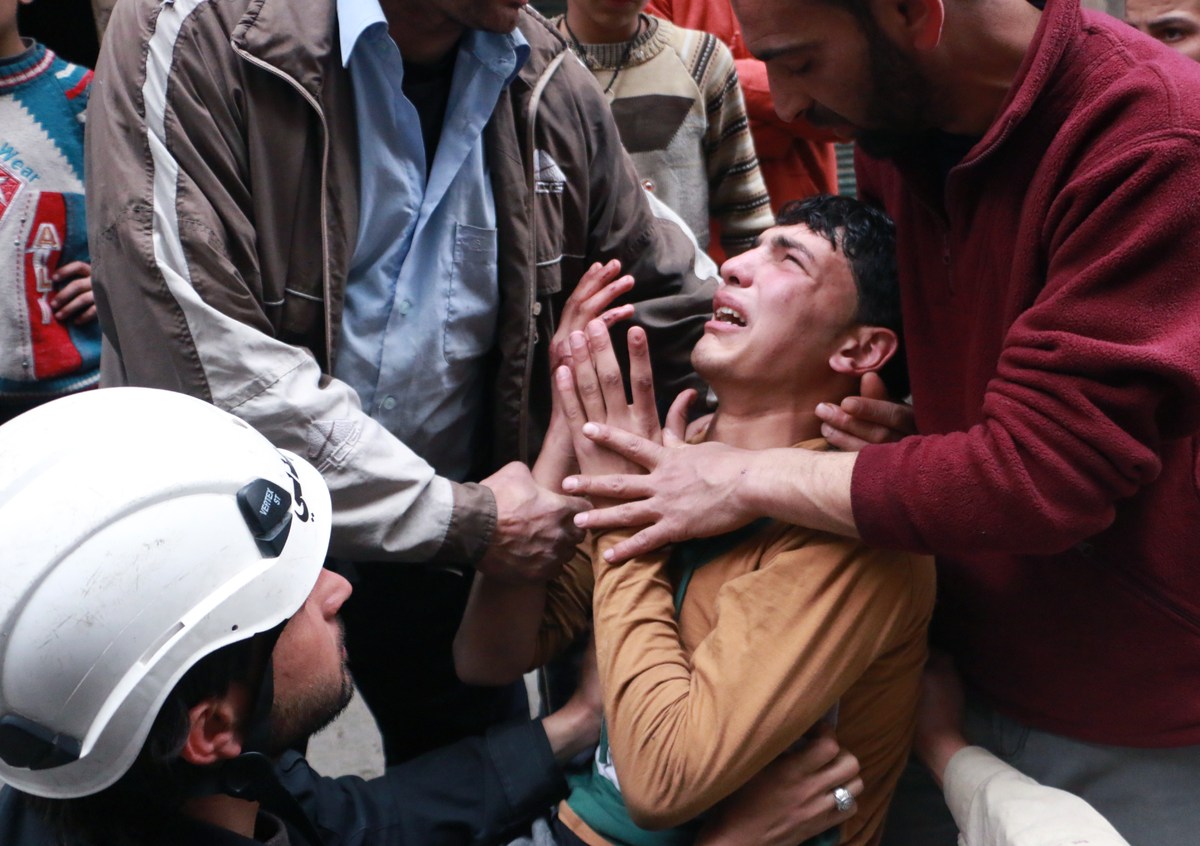
The main Western-backed opposition group, the Syrian National Coalition, said the poison gas attack hurt dozens of people, though it did not identify the gas used.
The Britain-based Syrian Observatory for Human Rights, an activist group that relies on a network of on-the-ground volunteers, said the gas attack happened during air raids that left heavy smoke over the area. It reported that people suffered from suffocation and breathing problems after the attack, but gave no further details.
State-run Syrian television blamed members of the al-Qaida-linked Nusra Front rebel group for the attack, saying they used chlorine gas to kill two people and injure more than 100. It did not say how it confirmed chlorine was used.
Chlorine, one of the most commonly manufactured chemicals in the U.S., is used to purify drinking water. But as a gas, it can be deadly, with the German army using it in warfare in World War I. The Geneva Protocol of 1925, which Syria signed, banned its use in battle.
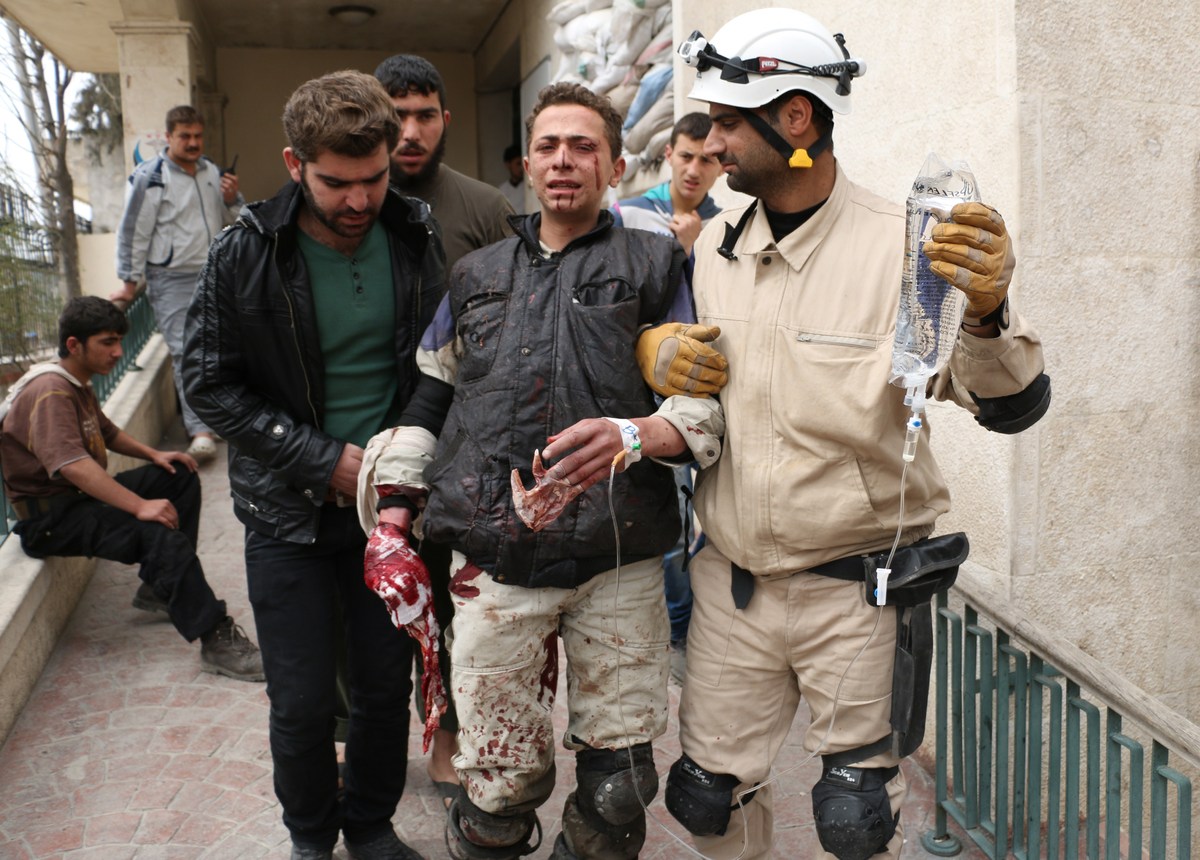
The TV report also claimed the Nusra Front is preparing for another chemical attack against the Wadi Deif area in the northern province of Idlib, as well as another area in Hama. The government station did not explain how it knew the Nusra Front's plans.
Activists in the village could not be reached Saturday.
An activist from Hama who is currently in Turkey and is in contact with residents told The Associated Press that the attack occurred around sunset Friday. The man, who goes with the name Amir al-Basha, said the air raids on the rebel-held village came as nearby areas including Morek and Khan Sheikhoun have witnessed intense clashes between troops and opposition fighters.
An amateur video posted online by opposition activists showed a hospital room in Kfar Zeita that was packed with men and children, some of whom breathing through oxygen masks. On one bed, the video showed six children, some appearing to have difficulty breathing while others cried.
The video appeared genuine and corresponded to other AP reporting of the attack.
Chemical weapons have been used before in Syria's 3-year-old conflict. In August, a chemical attack near the capital, Damascus, killed hundreds of people. The U.S. and its allies blamed the Syrian government for that attack, which nearly sparked Western airstrikes before a negotiated diplomatic settlement saw Assad's government agree to give up its chemical weapons. Damascus denied the charges and blamed rebels of staging the incident.
Before the August attack, there have been several incidents of toxic gases being used. Britain, France and the U.S. have spoken about chemical weapons use in the central city of Homs, Damascus and elsewhere.
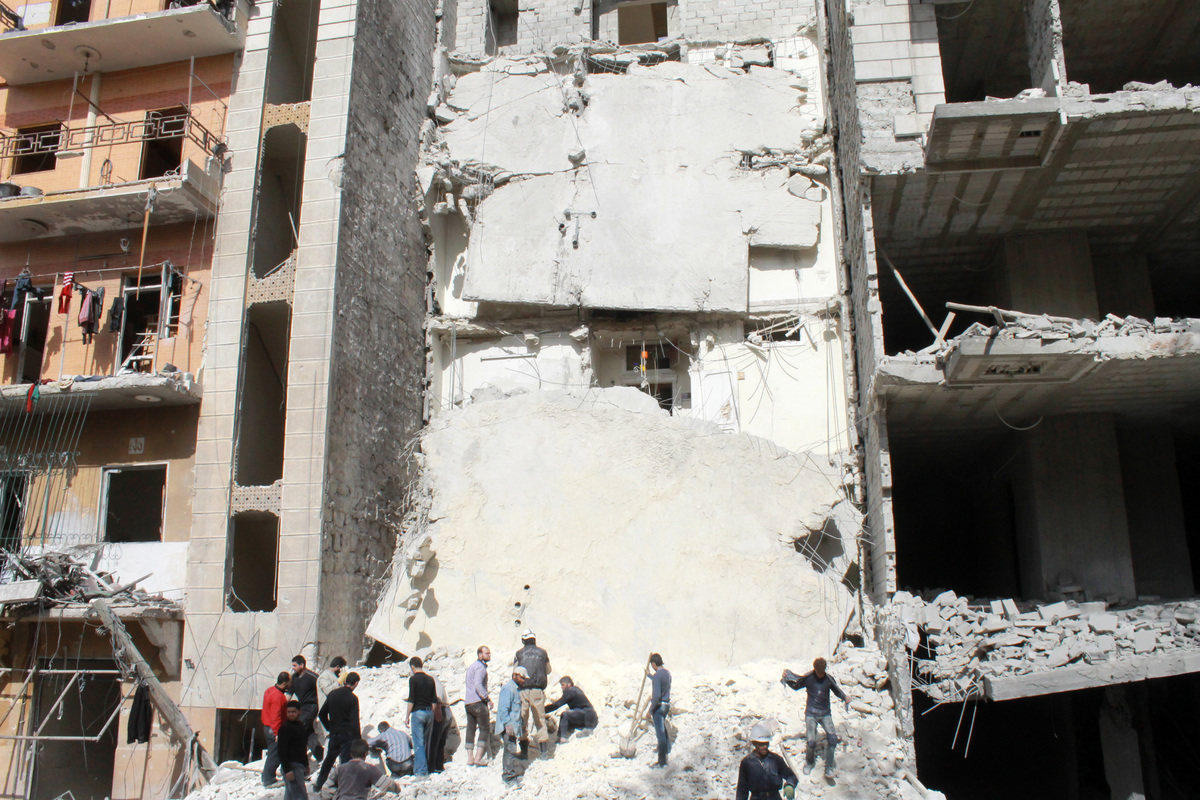
A U.N. weapons inspectors' report released in December identified four locations where chemical weapons likely had been used in 2013: Khan al Assal outside Aleppo, Jobar in Damascus' eastern suburbs, Saraqueb near Idlib in the northwest and Ashrafiah Sahnaya in the Damascus countryside. In two cases, inspectors reportedly found "signatures of sarin," a nerve agent.
The Syrian National Coalition called on the U.N. to conduct a "quick investigation into the developments related to the use of poisonous gas against civilians in Syria." The coalition also claimed that another chemical weapons attack Friday struck the Damascus suburb of Harasta, though state media did not report on it.
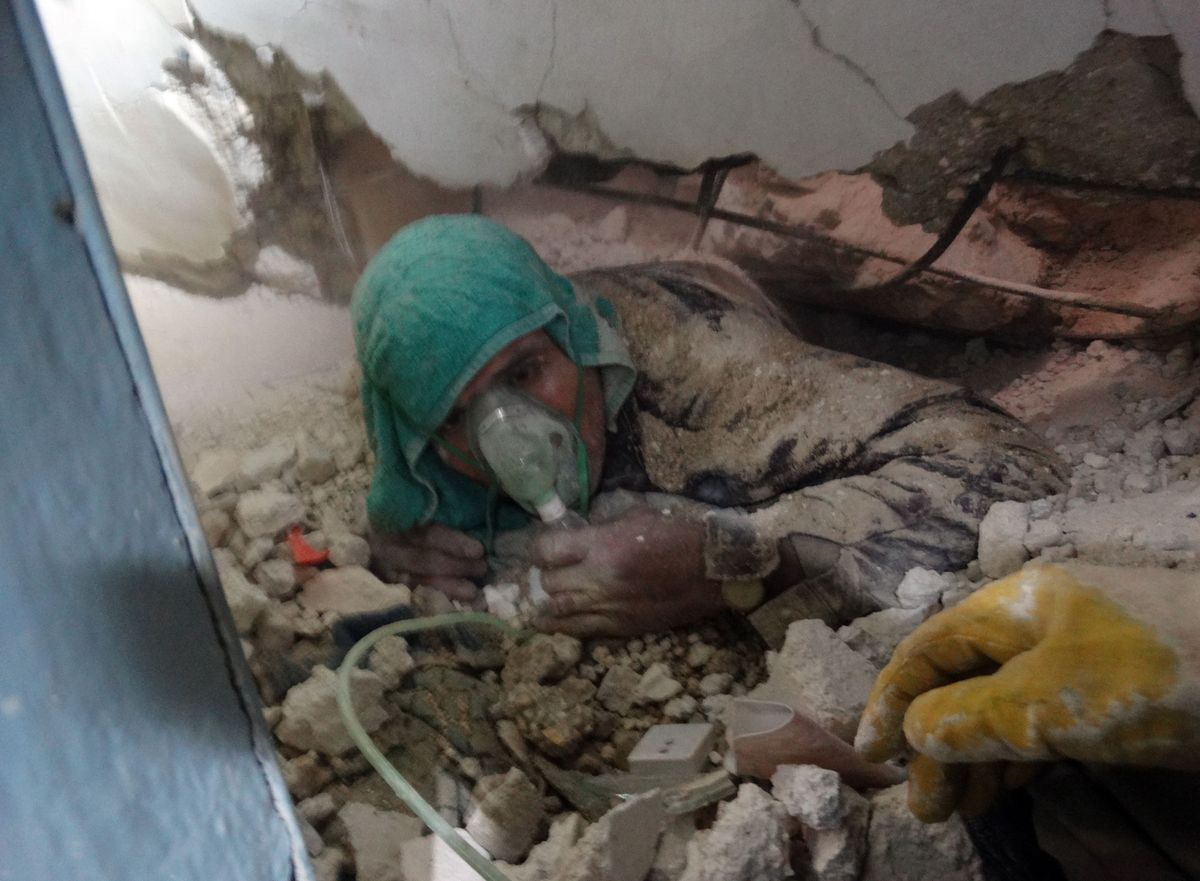
In Washington, the State Department said Friday that the U.S. had no information to corroborate the latest claims of a gas attack. Spokeswoman Jen Psaki said she would not speculate on any U.S. response if the reports were found to be accurate.
The chemical weapons attack in August caused an international outcry. A coalition formed to eliminate the weapons and now aims to remove and destroy 1,300 metric tons of chemicals held by the Assad government by June 30. Syria's government missed a Dec. 31 deadline to remove the most dangerous chemicals in its stockpile and a Feb. 5 deadline to give up its entire stockpile of chemical weapons. Assad's government cited security concerns and the lack of some equipment but has repeated that it remains fully committed to the process.
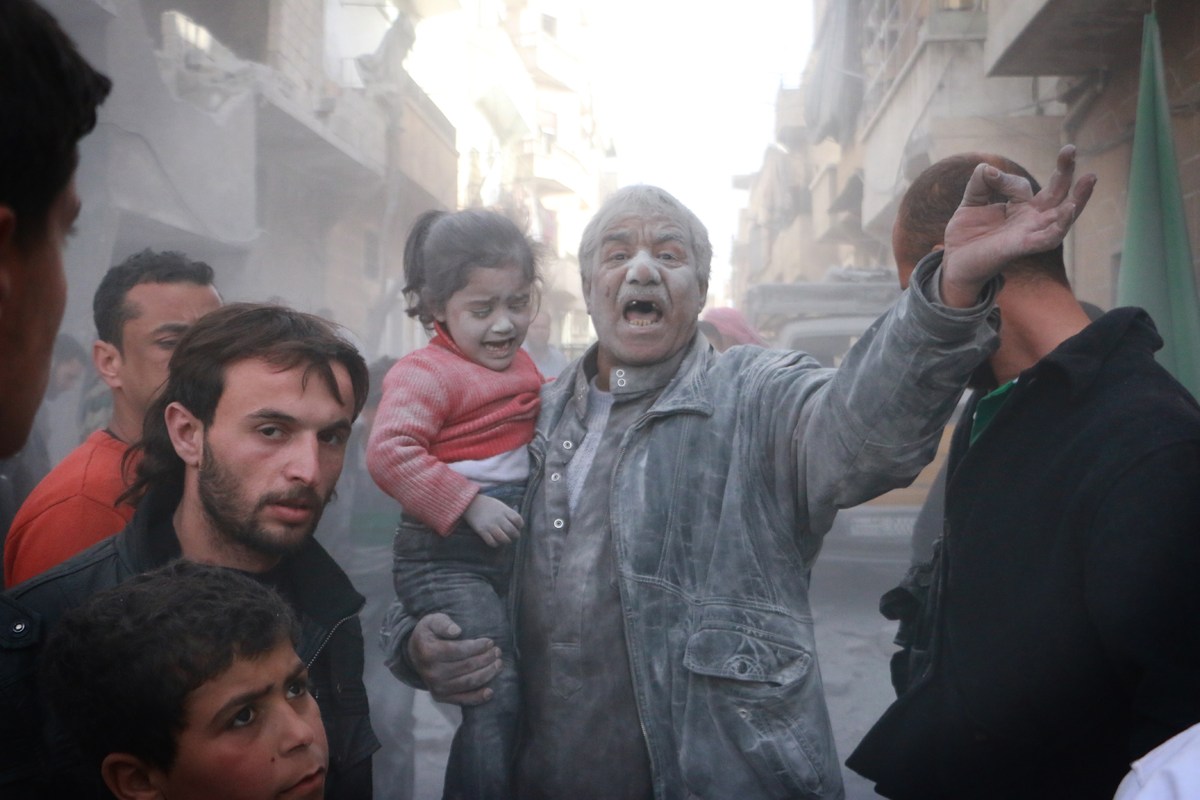
Meanwhile, violence continued Saturday elsewhere in Syria. In the northern city of Aleppo, Syria's largest and one-time commercial center, the Observatory and state television reported intense clashes, mostly near a main intelligence office in the city's contested neighborhood of Zahra.
Syrian state news agency SANA reported earlier Saturday that several mortar shells hit the government-held neighborhoods of Hamidiyeh and Khaldiyeh, killing at least six people and wounding 15.
Aleppo became a key front in the country's civil war after rebels launched an offensive there in July 2012.
__________________________________
U.S. Legal Pot Sales To Hit $8 Billion A Year In 2018: Report
Combined sales of legal recreational and medical marijuana in the United States is projected to reach more than $8 billion in 2018. That's according to a new report by Marijuana Business Daily citing data from the Marijuana Business Factbook, which forecasts that the 2018 retail marijuana industry could see an estimated $7.4 to $8.2 billion in sales.
Currently, there are 20 states with legal medical marijuana. Colorado and Washington have both legalized recreational marijuana and about a dozen other states are expected to legalize marijuana in some form in the coming years.
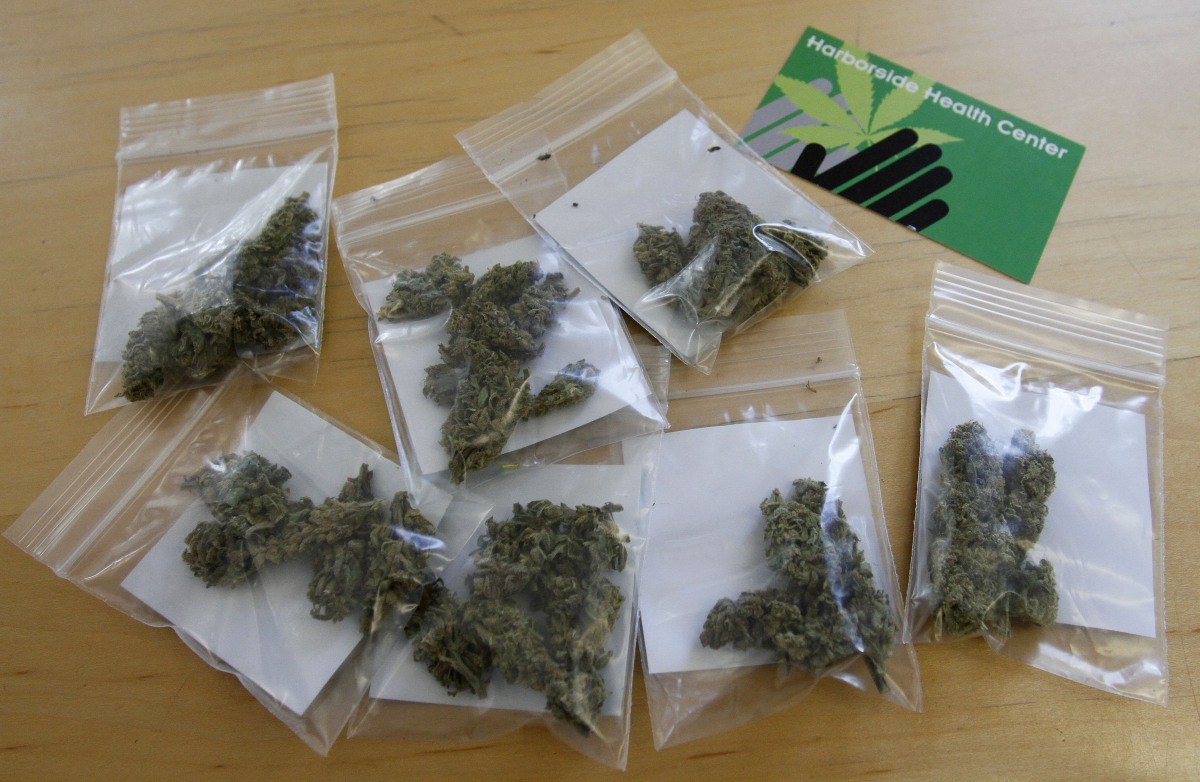
“This total is conservative –- the reality of retail sales could be larger,” Chris Walsh, editor of CannaBusiness Media, the publisher of both the Factbook and Marijuana Business Daily, said in a statement. “Nor does it include wholesale cannabis sales, or the billions of dollars in ancillary cannabusiness revenues such as growing equipment, real estate, legal fees, testing labs, paraphernalia, etc.”
Walsh's suggestion that sales could exceed that $8 billion mark is supported by another recent study that projects that the U.S. marijuana industry could be worth $10 billion by 2018.

If Colorado's first two months of legal recreational sales are any sign, the market nationally could see tremendous revenues. In January alone, 59 marijuana dispensaries -- a small fraction of the approximately 550 total dispensaries in the state that could qualify to sell legal cannabis -- generated $14 million in sales. Sales were also up slightly in February, bringing in a two-month total of about $7.6 million in medical and recreational taxes and fees into the state's coffers.
___________________________________
Bill to restore US unemployment insurance likely to deadlock in Congress.
• House speaker says he may not allow vote on measure
• Senate passed bill to reinstate benefits to two million people.
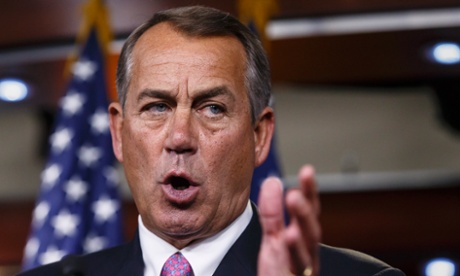
A bipartisan attempt to restore unemployment insurance to more than two million out-of-work Americans appeared likely to fall victim to deadlock in Congress on Tuesday.
The Senate passed legislation on Monday night that would temporarily extend lapsed emergency assistance measures that were first introduced after the banking crash, in exchange for reforms designed to curb fraud and claims by the very rich.
But the Republican speaker of the House of Representatives, John Boehner, said on Tuesday that he would not allow a vote on the bill without additional measures to stimulate job growth.
The bill, which passed the Senate by 59-38 with the support of six Republicans, seeks to address earlier concerns raised by House leaders by including proposals to pay for the extension through a separate reform of employee pension obligations.
But on Tuesday, Boehner's spokesman Michael Steel told the Associated Press that the House leadership was only “willing to look at extending emergency unemployment insurance as long as it includes provisions to help create more private sector jobs", something he said Senate Democrats were refusing to do.
At a press conference on Tuesday morning led by House majority leader Eric Cantor, the issue was not even addressed, and Congress will shortly break for Easter.
Moderate Republicans in the Senate have not given up on hopes of passing some form of unemployment insurance, but concede privately that they face a constantly shifting set of concerns from colleagues in the House.
One staffer told the Guardian that senator Dean Heller, a Nevada Republican whose home state has some of the worst unemployment rates in the country after the collapse of its construction bubble, was now seeking a meeting with House leaders to attempt to meet their outstanding concerns.
But conservative Republicans and many Democrats are more pessimistic about the prospects of moving forward on an issue that highlights the deep divide between the parties on how to address growing economic inequality and insecurity.
Some Republican activists claim the Senate is trying to “bully” the House into following its lead on something that many members of the House of Representatives do not see as a pressing issue in their home districts.
The federal insurance program is aimed at long-term unemployed workers whose state assistance has expired but was itself left to lapse in December, after Congress failed to agree to extend it during broader budget negotiations.
Efforts to find a temporary solution to fund the program have foundered, despite continued high US unemployment rates.
• Senate passed bill to reinstate benefits to two million people.

A bipartisan attempt to restore unemployment insurance to more than two million out-of-work Americans appeared likely to fall victim to deadlock in Congress on Tuesday.
The Senate passed legislation on Monday night that would temporarily extend lapsed emergency assistance measures that were first introduced after the banking crash, in exchange for reforms designed to curb fraud and claims by the very rich.
But the Republican speaker of the House of Representatives, John Boehner, said on Tuesday that he would not allow a vote on the bill without additional measures to stimulate job growth.
The bill, which passed the Senate by 59-38 with the support of six Republicans, seeks to address earlier concerns raised by House leaders by including proposals to pay for the extension through a separate reform of employee pension obligations.
But on Tuesday, Boehner's spokesman Michael Steel told the Associated Press that the House leadership was only “willing to look at extending emergency unemployment insurance as long as it includes provisions to help create more private sector jobs", something he said Senate Democrats were refusing to do.
At a press conference on Tuesday morning led by House majority leader Eric Cantor, the issue was not even addressed, and Congress will shortly break for Easter.
Moderate Republicans in the Senate have not given up on hopes of passing some form of unemployment insurance, but concede privately that they face a constantly shifting set of concerns from colleagues in the House.
One staffer told the Guardian that senator Dean Heller, a Nevada Republican whose home state has some of the worst unemployment rates in the country after the collapse of its construction bubble, was now seeking a meeting with House leaders to attempt to meet their outstanding concerns.
But conservative Republicans and many Democrats are more pessimistic about the prospects of moving forward on an issue that highlights the deep divide between the parties on how to address growing economic inequality and insecurity.
Some Republican activists claim the Senate is trying to “bully” the House into following its lead on something that many members of the House of Representatives do not see as a pressing issue in their home districts.
The federal insurance program is aimed at long-term unemployed workers whose state assistance has expired but was itself left to lapse in December, after Congress failed to agree to extend it during broader budget negotiations.
Efforts to find a temporary solution to fund the program have foundered, despite continued high US unemployment rates.
____________________________________
Washington mudslide death toll climbs
to 33 as missing count drops.
• Billy L Spillers of Arlington identified among dead
• All but three of dead identified; 10 still missing.
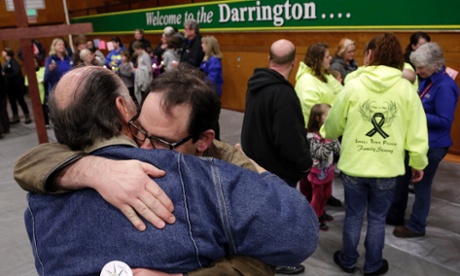
The death toll from the landslide that hit the Washington town of Oso on 22 March rose to 33 on Monday, according to the Snohomish County medical examiner's office, which said all but three of the dead have been identified.
The latest name added to the list is Billy L Spillers, 30, of Arlington. Like the others, he died of multiple blunt force injuries in the slide that crushed the residential area along the North Fork of the Stillaguamish River about 55 miles northeast of Seattle. His name had been on the list of missing.
The number of missing dropped to 10 on Monday, said Kelly Stowe, a spokeswoman for the medical examiner's office. The number of missing does not necessarily correlate with the number of dead, said Stowe. The missing list remains fluid as names are added and removed, she said.
Spillers was a navy chief petty officer who lived with his wife, Jonielle, and their four children. Jonielle Spillers was at her nursing job when the landslide hit their house. Spillers' four-year-old son survived and was rescued by a helicopter.
Spillers's daughter Kaylee, 5, and stepson Jovon Mangual, 13, have been identified among the dead. Two-year-old daughter Brooke is listed among the missing.
As the search continues in the debris, the army corps of engineers is working on a berm – a rock and gravel barrier – to prevent the river from flooding parts of the debris field and state Highway 530. Engineers hope to finish the berm in a week.
A forecast of warmer and mostly drier spring weather this week should help. But rain showers on Tuesday will cause the river to rise about a foot in the pool formed by the mudslide, the National Weather Service said. That is 2ft or 3ft below the high reached on 30 March.
• All but three of dead identified; 10 still missing.

The death toll from the landslide that hit the Washington town of Oso on 22 March rose to 33 on Monday, according to the Snohomish County medical examiner's office, which said all but three of the dead have been identified.
The latest name added to the list is Billy L Spillers, 30, of Arlington. Like the others, he died of multiple blunt force injuries in the slide that crushed the residential area along the North Fork of the Stillaguamish River about 55 miles northeast of Seattle. His name had been on the list of missing.
The number of missing dropped to 10 on Monday, said Kelly Stowe, a spokeswoman for the medical examiner's office. The number of missing does not necessarily correlate with the number of dead, said Stowe. The missing list remains fluid as names are added and removed, she said.
Spillers was a navy chief petty officer who lived with his wife, Jonielle, and their four children. Jonielle Spillers was at her nursing job when the landslide hit their house. Spillers' four-year-old son survived and was rescued by a helicopter.
Spillers's daughter Kaylee, 5, and stepson Jovon Mangual, 13, have been identified among the dead. Two-year-old daughter Brooke is listed among the missing.
As the search continues in the debris, the army corps of engineers is working on a berm – a rock and gravel barrier – to prevent the river from flooding parts of the debris field and state Highway 530. Engineers hope to finish the berm in a week.
A forecast of warmer and mostly drier spring weather this week should help. But rain showers on Tuesday will cause the river to rise about a foot in the pool formed by the mudslide, the National Weather Service said. That is 2ft or 3ft below the high reached on 30 March.
___________________________________
Venezuela lashes out at Spain after exports of riot gear halted.
Maduro government says Spain lacks 'moral authority' after minister called for dialogue following weeks of unrest.
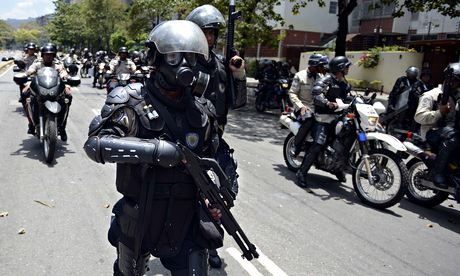
The Venezuelan government has questioned the "moral authority" of the Spanish government after Madrid suspended exports of anti-riot and police gear to its former colony.
Following weeks of unrest and violence in Venezuela, Spain's Conservative government quietly decided to suspend sales last month, the foreign minister, José Manuel García Margallo, said in Athens on Saturday.
"It is not logical to add fuel to the fire when there is a conflict," he said. "It's a way of saying that the climate of violence should be replaced by a climate of dialogue."
The comments drew sharp criticism from Nicolás Maduro's government in Venezuela. It said it "categorically rejects the unfortunate remarks" by García Margallo, "whose government doesn't have the moral authority to offer advice on violence or dialogue when the world has witnessed how Spanish people have risen up to protest at policies that are both exclusionary and in violation of human rights".
Thirty-nine people have been killed and more than 600 injured in Venezuela in ongoing clashes between security forces and anti-government protesters angered by soaring crime, rampant inflation and food shortages.
The Venezuelan government has defended its actions against protesters, arguing that it has a constitutional obligation to maintain public order by using "legal, proportional and varying public force". It has described the protesters as "anti-democratic opposition forces who have exercised armed violence against the citizens and public authority and who have destroyed and set fire to universities, health centres, parts of the public transport system and other public services".
Venezuela is one of Spain's biggest buyers of riot control equipment. Spain's decision to suspend sales was made quietly in an attempt to minimise damage to diplomatic relations between the two countries. An estimated 200,000 Spaniards live in Venezuela, and more than 100 Spanish businesses have operations there.
García Margallo said his government had been following developments in Venezuela closely, particularly the fate of 30 Spaniards who have been detained. He said Spanish officials had reached out to Caracas "to try do everything they can to establish a climate of national reconciliation".
The Venezuelan government made clear in its statement where its loyalties lay, expressing "respect and solidarity to the valiant Spanish people in their struggle for civil, political, economic and social rights".
It urged the Spanish government to "promote dialogue with its distinct social groups who are seeking justice in Spain", in the same way, it said, that Maduro had done in Venezuela.
______________________________________
Search for Inca 'lost city' in Amazon may endanger indigenous people
A six-week expedition starting in July will try to find Paititi in the Megantoni National Sanctuary in
south-east Peru.
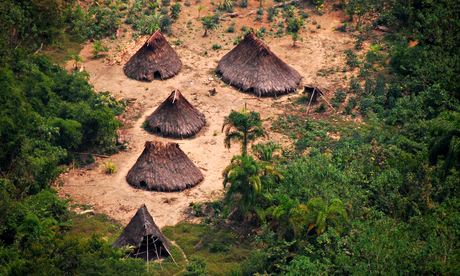
A French writer and adventurer plans to explore one of the most remote parts of the Peruvian Amazon in search of a "lost" or "secret city" that may have been built by the Incas, but there are fears that the expedition could endanger the health of isolated tribes that have never been exposed to common human diseases.
Thierry Jamin believes that the city, which he calls "Paititi", could lie somewhere in a 215,000-hectare protected area called the Megantoni National Sanctuary in the Cuzco region of south-east Peru.
"The magnificent discoveries realised by my group in the valleys of Lacco, Chunchusmayo and Cusirini in the north of the department of Cuzco lead towards a precise zone situated in the national sanctuary of Megantoni," Jamin told the Guardian via email.
"Several natives of the forest – Matsiguengas – assert that 'monumental ruins' exist at the top of a strange square mountain. I think that we are very close to officialise the existence of this big archaeological site."
According to his website, Jamin is planning a six-week expedition starting in July. He will be assisted by an NGO based in Cuzco that he leads and a group of Machiguengas from a village near the sanctuary.
His website describes Paititi, or "Paititi-Eldorado", as the "Incas' secret city" – "one of the most fascinating stories of the Inca mythology", the "biggest archaeological enigma of South America", and the place where the Incas hid "all the treasures of [their] empire" when Europeans invaded.

The search for Paititi or an Inca "lost city" has attracted scores of people and considerable controversy ever since the 16th century, with conflicting theories and ideas about where it might be and whether it really exists.
But some experts fear that such an expedition would pose a threat to isolated indigenous Nanti people – sometimes called "Kugapakoris" – within the sanctuary. One of the main reasons for the sanctuary's creation 10 years ago was to protect groups of indigenous people who have had little or no contact with outsiders and are extremely vulnerable to infectious diseases because of their lack of resistance.
According to the sanctuary's "master plan" for 2007-2011 – a 160-page government document outlining strategies and programmes to manage the area – the 215,000 hectares are divided into a number of "zones" where different activities are permitted. The biggest, most remote zone is in the sanctuary's far east and is called the "Strict Protection Zone" (ZPA). Its first stated aim is to protect "voluntarily isolated indigenous people", with scientific investigation only allowed in "exceptional circumstances".
Jamin is keeping the precise destination of the expedition a secret, but told the Guardian he intended to travel up the river Ticumpinia – not the river Timpia where he said there were "numerous Kuga-Pakuri communities".
"We don't want to tell anyone about our study zones, nor disseminate the exact locations of the sites we have found," he said.
Lelis Rivera, who works for the NGO Cedia and played a key role in the sanctuary's creation, pointed out that the presence of any outsiders in the sanctuary "could cause danger to the people living there" and that entering the ZPA in particular is "completely prohibited" by Peruvian law.
"Any people currently living in the upper Timpia or Ticumpinia regions are extremely vulnerable to germ transmission – that's the nature of living in relative social and immunological isolation," said anthropologist Christine Beier from the NGO Cabeceras Aid Project and one of the world's leading experts on Nanti society and history.
Jamin told the Guardian that he will apply to the ministry of environment, which oversees management of "protected natural areas", for permission to enter the Megantoni sanctuary. He said he has already applied for permission from the ministry of culture.
However, Ramon Rivero Mejia at the culture ministry says it has received no application from either Jamin, any member of his team or the NGO that Jamin presides over.
Some experts doubt that Paititi is where Jamin thinks it is. "The Incas conquered territories of the Machiguenga and Piro and built roads, bridges and some fortified settlements, meaning it's possible that in Megantoni some Inca-type buildings and objects will be found," said Martti Parssinen, a Finnish archaeologist and historian who has researched Peru and the Incas for decades.
"Nevertheless, Paititi is not there … At first, it was located from the confluence of the Madre de Díos and the Beni rivers toward the east or south, but during the colonial period some Inca refugees probably reestablished it near the present Brazilian Pacaas Novos mountains."
Asked by the Guardian why he thinks archaeological remains in Megantoni might be related to the Incas, Jamin said: "We don't know if they're Inca or pre-Inca. One of the objectives of our 2014 campaign will be to establish that."
______________________________________
Dutch priest shot dead in Homs
Francis van der Lugt appears to have been targeted by lone gunman in rebel-held district of Syrian city
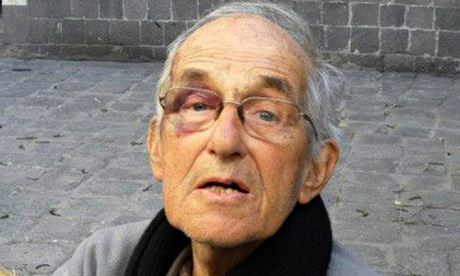
A masked gunman shot dead a Dutch priest in the garden of a monastery in the Syrian city of Homs on Monday.
Father Francis van der Lugt, 75, a Jesuit – the same order as Pope Francis – had lived in Syria for decades and had refused to be evacuated with other civilians from the battleground city of Homs.
The gunman's motives were not known and no one immediately claimed responsibility for the killing, which took place in Bustan al-Diwan, a rebel-held district blockaded for more than a year by forces loyal to the Syrian president, Bashar al-Assad.
But the fact that Van der Lugt was attacked in a rebel-held area may underline the fears of many in Syrian Christian and Muslim minorities over the fate of their communities. Over the past year, hardline rebel groups including the al-Qaida-linked Nusra Front have become more influential among opposition fighters in the city.
Van der Lugt's death was first reported by another Homs-based priest, Assad Nayyef, as well as the British-based Syrian Observatory for Human Rights and Syria's state-run Sana news agency.
It appears that Van der Lugt was directly targeted. A single gunman walked into the monastery, entered the garden and shot him in the head, said the Rev Ziad Hillal, a priest who was in the convent when the attacked occurred. "I am truly shocked. A man of peace has been murdered," he said in a phone interview with Vatican Radio.
The Rev Federico Lombardi, a Vatican spokesman, said Van der Lugt, was "a man of peace who with great courage had wanted to remain faithful, in an extremely risky and difficult situation, to the Syrian people to whom he had dedicated for a long time his life and spiritual service."
An activist based in a blockaded rebel area said rebel fighters were shocked by the priest's death. "The man was living with us, eating with us, sleeping with us. He didn't leave, even when the blockade was eased," said Beibars Tilawi. He said the priest was well-liked for his efforts to get the blockade lifted and alleviate widespread suffering and hunger among civilians.
The secretary of the Dutch Jesuit order, Father Jan Stuyt, said the slain priest had been living in Syria since the mid-1960s and was on good terms with members of the country's Muslim majority. "He is like a martyr for the interreligious dialogue," he said.
Van der Lugt repeatedly refused to leave Bustan al-Diwan despite the violence and a series of UN evacuations. A friend who spoke on condition of anonymity because he feared for his safety said Van der Lugt refused to leave until all Christians were evacuated.
It is not clear how many Christians remain trapped in rebel-held parts of Homs. In February there were about 200 Christian families, according to Syrian Red Crescent figures.
Van der Lugt also sought to draw attention to the suffering of civilians in blockaded Homs. "Hunger defeated us! We can see its signs drawn over the faces," he wrote in January on a Syrian Christian Facebook page.
"People are wandering the streets screaming; We are starving, we need food! They stop by the inhabited houses trying to find some food. Hunger breaks the rules and eliminates all moral principles. We are living a scary reality. Human beings turn into wild animals living in the wild."
Albert Abdul-Massih, who worked with Van der Lugt, said the priest held a doctorate in psychiatry and led an austere life. "He was a Christian clergyman but he wasn't conservative," he said. "We learned humanity from him, and he used to love Muslims as much as he loves Christians … He was treating people for free and he was a fluent Arabic speaker."
Abdul-Massih added: "He called me two days ago and told me that he is hopeful that the siege will end soon. His death was a big loss."
Sana blamed "terrorists" for the priest's death but offered no details. The government uses the term for anti-Assad armed rebels.
Another Jesuit priest, Father Paolo Dall'Oglio of Italy, went missing in July after travelling to meet Islamist militants in the eastern city of Raqqa. The city fell into rebel hands in March 2013 and was subsequently taken over by radicals including the al-Qaida breakaway group the Islamic State in Iraq and the Levant.
______________________________________
Afghanistan elections: early signs point to second round showdown
Former foreign minister Abdullah Abdullah and former finance minister Ashraf Ghani appear to be leading presidential race
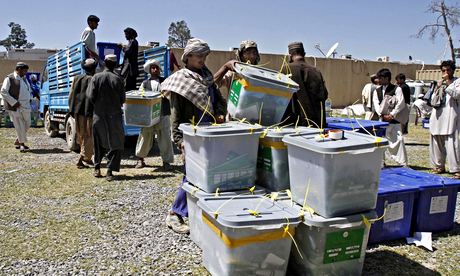
Afghanistan has begun tallying votes from the weekend's historic presidential elections, a process that will take weeks to complete, but rough early counts suggest that the country is heading for a second-round showdown between two former ministers.
Voters defied Taliban intimidation, turning out in unexpectedly high numbers on Saturday to choose a successor to Hamid Karzai, who has ruled for 12 years and is barred by the constitution from seeking a third term.
The Taliban mounted nearly 700 attacks nationwide, said General Zahir Azimy, spokesman for the defence ministry, but fears of a bloody, dramatic attack in the capital or another major city during the election proved unfounded. The day ended with an outpouring of support for the 350,000 police and soldiers on duty around the country, who for the first time secured an election without foreign support.
Now diplomats and observers are calling for candidates to respect Afghans' display of trust in their young democracy by allowing election organisers to sort through results and complaints, after all three front-runners said they were confident of success and warned of fraud by other camps.
"Premature announcements will only undermine this historic political transition process and its democratic, peaceful character," the United Nations envoy to Afghanistan, Jan Kubis, warned the groups competing for power.
Eight men are competing to replace Karzai, but none are expected to have scrambled over the 50% threshold that would mean immediate victory, despite their own optimism, so the top two will probably compete in a run-off scheduled for next month.
Former foreign minister Abdullah Abdullah, who was Karzai's main rival in a 2009 election marred by widespread cheating, had promised his followers a knock-out victory if the government contained fraud. He is confident that he was doing well despite ballot paper shortages in his strongholds.
"Our performance has been very good," he told the Guardian. "[The fraud] is not like anything we saw in the earlier election, although there are still worrying signs."
Former finance minister and World Bank technocrat Ashraf Ghani posted on his website preliminary results, collated by observers, claiming 57% of the vote.
The main loser appears to be another former foreign minister, Zalmai Rassoul, a softly spoken moderate who was believed to be Karzai's preferred successor. Although the president has stayed strictly neutral in public, he cajoled his brother into abandoning a separate bid for the top office to join a man who has royal blood but only a limited support base.
The official result is not due for over two weeks. Voting papers have to be collected from around the country, including polling stations so remote that they were transported in on donkeys and must be brought out the same way.
In warehouses in Kabul, tallying of votes by duplicate teams – to limit room for fraud – began on Monday, but the earliest results from the painstaking process are not due for several days.
New anti-fraud measures have given a snapshot of the result, however, which was seized on by campaign teams and journalists around the country. Each polling station was required to post up a copy of their results for anyone to read or photograph, and the day after the vote details of individual tallies began to circulate online.
There are over 20,000 polling stations so any collection of results is sporadic, and by Monday many results had been torn down or disappeared from polling stations across the city.
However across Kabul, in polling results from areas home to different several different ethnic groups recorded by the Guardian, Abdullah and Ghani switched places at the top. Rassoul, who had claimed the city's educated youth as a key group of supporters, rarely came in second and never made first place.
______________________________________
Ukraine: pro-Russia activists proclaim independent republic in Donetsk
Protesters occupying government building in eastern city vow to follow Crimea in holding referendum on joining Russia
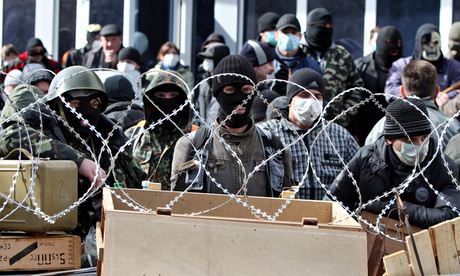
Pro-Russian activists occupying a government building in the eastern Ukrainian city of Donetsk have proclaimed the creation of a sovereign "people's republic" independent of the capital, Kiev.
The announcement, which was posted on YouTube, was delivered by a protest spokesperson outside a building currently occupied by several thousand Russia supporters, some of them armed.
"Seeking to create a popular, legitimate, sovereign state, I proclaim the creation for the sovereign state of the People's Republic of Donetsk," the spokesperson said to cheers from the gathered crowd.
The Interfax news agency reported that the self-proclaimed leaders of Donetsk had vowed to hold a referendum on regional sovereignty no later than 11 May. Ukrainian presidential elections have been set for 25 May.
The regional news website Ostrov said the activists wanted to join the Russian Federation in a similar way to the Crimean peninsula.

Ukraine's acting president, Olexander Turchynov, said the separatist call in Donetsk and pro-Russian protests in two other cities in the east of the country were evidence of a "second stage" of Russian operations "playing out the Crimean scenario".
The acting prime minister, Arseny Yatseniuk, told a cabinet meeting in Kiev: "An anti-Ukrainian plan is being put into operation ... under which foreign troops will cross the border and seize the territory of the country."
Pro-Russian protesters remain in control of security service headquarters in the eastern Ukrainian region of Lugansk. Activists vacated an administration building in Kharkiv on Monday after occupying it overnight.
On Sunday, a Russian soldier shot dead a Ukrainian naval officer in eastern Crimea, one of the few fatalities reported since Russia took control of the Black Sea peninsula in March.
The shooting was announced by Ukraine's defence ministry. Russian media said a group of Ukrainian soldiers in the village of Novofedorivka had been drinking and were on their way home when they passed Russian soldiers guarding an entry to the military base where they previously worked, and an argument broke out between the two groups.
"We confirm the death of a Ukrainian officer in the village of Novofedorivka in Crimea," the ministry's press service told Interfax-Ukraine. According to the news agency, the Russian serviceman shot dead the Ukrainian officer near the hostel where the latter lived.
Dmytro Tymchuk, director of the Centre for Military and Political Studies, said on Facebook on Monday that Russian junior sergeant Ye S Zaitsevv shot a Ukrainian serviceman – whom he named as Major K of military unit No 1100 – twice in the head at point-blank range.
He said Captain A Yermolenko, who was sharing a hostel room with the murdered Ukrainian, was beaten and abducted by Russian troops. Tymchuk said Russian servicemen had also taken the body of the Ukrainian major. A criminal investigation has been opened.
Ukraine's prime minister accused Russia of sowing unrest in his country's eastern provinces as a pretext for dispatching troops across the border.
Speaking at an emergency cabinet meeting on Monday, Arseniy Yatsenyuk said Russia was behind the seizure of several government buildings in eastern regions, which had led to an increase in secessionist sentiment.
"The plan is to destabilise the situation, the plan is for foreign troops to cross the border and seize the country's territory, which we will not allow," he said, adding that people engaged in the unrest had Russian accents.
Yatsenyuk said Russian troops remained stationed within 19 miles (30km) of the frontier.
Earlier in the day, the interior ministry reported that armed gunmen had occupied a security services building in Luhansk, 15 miles west of the Russian border and scene of frequent protests since Ukraine's pro-Moscow president was ousted in February.
Police in Luhansk say they had been put on alert and had blocked all entrances to the city.
A crowd of pro-Russian activists stormed the building on Sunday. Local media reported that demonstrators pelted the building with eggs, and then stones, a smoke grenade and finally a firebomb. The flames were reportedly quickly extinguished. Police said nine people were injured during the assault on the building.
Eastern Ukraine was the heartland of support for Viktor Yanukovych, the president who fled to Russia in February after months of protests. About half of the region's residents are ethnic Russians, many of whom believe Ukraine's acting authorities are Ukrainian nationalists who will oppress Russians.
Ukraine's interim authorities deny they are infringing the rights of the ethnic Russian population. Russia has moved large contingents of troops near the Ukrainian border, amid speculation that unrest in eastern Ukraine could be used as a pretext for a Russian incursion.
Since Crimea held a secession referendum and was annexed by Russia in March, calls for similar votes in Ukraine's east have emerged.
______________________________________
Briton among two United Nations workers shot dead in Somalia
UN says two foreign staff were killed in 'callous attack' at airport in Galkayo by man witness says was wearing police uniform
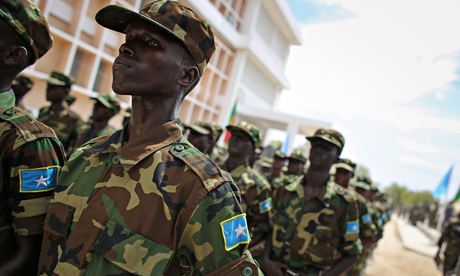
Two foreign United Nations workers – a Briton and a Frenchman – have been shot dead on arrival at an airport in Galkayo, central Somalia, officials said.
A UN source confirmed the pair were international staff members with the UN Office on Drugs and Crime (UNODC).
A statement issued by the government of the northern breakaway state of Puntland in Somalia identified the two victims as Briton Simon Davis and Frenchman Clement Gorrissen.
Nicholas Kay, special representative of the UN secretary-general for Somalia, said: "Our UN colleagues were working in support of the Somali people's aspiration for a peaceful and stable future. There can be no justification for such a callous attack. I call on the authorities to conduct a full investigation immediately and bring the perpetrators to justice without delay."
The UK Foreign Office said it was aware of the death of a British national in Somalia on Monday and was ready to provide consular assistance to the family. AFP reported that sources identified the second victim as French.
"Two white men have been shot inside the airport as they got off a plane," local security official Mohamed Mire said. An airport official said the attacker was dressed in a police uniform.
"One of them died inside the airport and the other one was rushed to hospital where he later died of the injuries. Both of them were white men," said Hassan Ahmed, who said he witnessed the incident.
Galkayo is 370 miles (575km) north of the capital Mogadishu and lies on the border with Puntland.
UN security in Galkayo, which is outside of effective central government control, is normally extremely tight.
The UNODC has been working to combat piracy in Puntland and has built a new prison in the state capital, Garowe, which opened last week to house pirates who have been sentenced in other countries in the region, notably the Seychelles. The UNODC said the building was a key part of its maritime crime programme in the Horn of Africa.
"The two were a Frenchman and a Briton and they were supposedly staying in Galkayo for two days before heading to Garowe," said Abdirisak Mohamed Dirir, general director of Puntland's anti-piracy department.
The two men had flown into Galkayo to meet Somali officials on the issue of regulating the money transfer services that replace a formal banking system in Somalia, and were looking at the financial flow of money related to Somalia's pirate attacks, according to reports.
The executive director of UNODC, Yury Fedotov, said: "I condemn in the strongest possible terms the killing of two of my colleagues in a cruel and senseless attack. I hope the relevant authorities in Somalia will undertake every effort to ensure that their killers are swiftly apprehended and brought to justice.
"I would also like to offer my most profound condolences to the family, loved ones, friends and colleagues of these two individuals, who were so committed and dedicated to UNODC's work."
UN staff members have been regularly targeted in Somalia, where the fragile internationally backed government, supported by African Union troops, is battling al-Qaida-linked al Shabaab rebels, although the assaults have tended to be on a larger-scale.
In February, at least six people were killed in a suicide car bomb attack targeting a United Nations convoy close to Mogadishu's heavily fortified international airport, among them four local security escorts working for the UN.
In June last year, al-Shabaab carried out a raid against a UN compound in Mogadishu, killing 11 people.
_____________________________________
Solomon Islands flash floods kill at least 19 people
Forty people are missing and 49,000 homeless after entire communities washed away following heavy rains
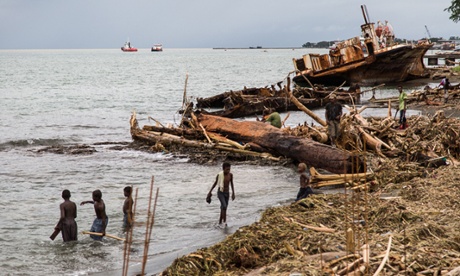
Devastating flash floods in the Solomon Islands have killed at least 19 people, while 40 are still missing and an estimated 49,000 people are homeless.
Entire riverside communities and bridges were washed away when the Matanikau river in Honiara broke its banks on Thursday. The government declared a state of emergency.
Rivers in the north-west, central and north of the island also flooded, destroying homes and displacing communities.There are more than 5,500 people in three of the most populous of the 13 evacuation shelters in Honiara, where aid groups report dengue fever is threatening to spread.
Water supplies and infrastructure including sewerage, electricity and have also been damaged, Reuters reported.
"This is unprecedented, and I've seen earthquakes and tsunamis and other very bad flooding incidents,” said the country director of Oxfam, Katie Greenwood. “But this flash flooding is unlike anything that I've seen previously here in the country.”
The low pressure weather system which brought the heavy rains to the Solomon Islands has now become tropical cyclone Ita. Ita, a category one cyclone, is south of Papua New Guinea and travelling westward towards Queensland. The Australian Bureau of Meteorology expects it to intensify to a category three storm over the next few days.
Australia has boosted aid to the Solomons, donating an extra $250,000 in emergency relief assistance.
The floods cut roads throughout the capital, but the Honiara international airport has reopened to limited commercial flights, according to the UN.
The Australian foreign minister, Julie Bishop, said the money would be in addition to an initial announcement of $50,000 on Friday.
Australia will also deploy two engineers and two rapid-response team members to help the Solomon Islands government, UN and non-governmental organisations respond to the disaster.
Bishop has spoken to the Solomon Islands prime minister, Gordon Lilo, and expressed condolences for the loss of life. “[Lilo] said that this is what he wanted – he wanted engineers and relief workers,” Bishop told ABC’s Insiders on Sunday.
“They didn't want money at this stage because they want actual equipment and people. But we stand ready to support the Solomon Islands. Australia's a very close friend of the Solomon Islands and we'll certainly do what we can to support them at this time.”
The Australian high commission in Honiara is contacting Australians in the country to check on their welfare and safety, and is helping recovery efforts along with the Australian federal police officers based there. So far no Australians have been reported missing.
The Department of Foreign Affairs and Trade has changed travel advice after the floods.
New Zealand’s prime minister, John Key, said on Monday the country’s aid contribution would likely increase “considerably” as further damage assessments are carried out. New Zealand has so far committed $300,000 in aid and supplies.
On Saturday the Solomon Islands was jolted by a magnitude 6.0 earthquake which caused further damage. The islands are part of the Pacific’s “ring of fire” tectonic activity zone.

Devastating flash floods in the Solomon Islands have killed at least 19 people, while 40 are still missing and an estimated 49,000 people are homeless.
Entire riverside communities and bridges were washed away when the Matanikau river in Honiara broke its banks on Thursday. The government declared a state of emergency.
Rivers in the north-west, central and north of the island also flooded, destroying homes and displacing communities.There are more than 5,500 people in three of the most populous of the 13 evacuation shelters in Honiara, where aid groups report dengue fever is threatening to spread.
Water supplies and infrastructure including sewerage, electricity and have also been damaged, Reuters reported.
"This is unprecedented, and I've seen earthquakes and tsunamis and other very bad flooding incidents,” said the country director of Oxfam, Katie Greenwood. “But this flash flooding is unlike anything that I've seen previously here in the country.”
The low pressure weather system which brought the heavy rains to the Solomon Islands has now become tropical cyclone Ita. Ita, a category one cyclone, is south of Papua New Guinea and travelling westward towards Queensland. The Australian Bureau of Meteorology expects it to intensify to a category three storm over the next few days.
Australia has boosted aid to the Solomons, donating an extra $250,000 in emergency relief assistance.
The floods cut roads throughout the capital, but the Honiara international airport has reopened to limited commercial flights, according to the UN.
The Australian foreign minister, Julie Bishop, said the money would be in addition to an initial announcement of $50,000 on Friday.
Australia will also deploy two engineers and two rapid-response team members to help the Solomon Islands government, UN and non-governmental organisations respond to the disaster.
Bishop has spoken to the Solomon Islands prime minister, Gordon Lilo, and expressed condolences for the loss of life. “[Lilo] said that this is what he wanted – he wanted engineers and relief workers,” Bishop told ABC’s Insiders on Sunday.
“They didn't want money at this stage because they want actual equipment and people. But we stand ready to support the Solomon Islands. Australia's a very close friend of the Solomon Islands and we'll certainly do what we can to support them at this time.”
The Australian high commission in Honiara is contacting Australians in the country to check on their welfare and safety, and is helping recovery efforts along with the Australian federal police officers based there. So far no Australians have been reported missing.
The Department of Foreign Affairs and Trade has changed travel advice after the floods.
New Zealand’s prime minister, John Key, said on Monday the country’s aid contribution would likely increase “considerably” as further damage assessments are carried out. New Zealand has so far committed $300,000 in aid and supplies.
On Saturday the Solomon Islands was jolted by a magnitude 6.0 earthquake which caused further damage. The islands are part of the Pacific’s “ring of fire” tectonic activity zone.
______________________________________
White House defends soaring number of deportations for minor crimes
Immigration rights activists say administration has stepped up deportations to appease Republican opponents of reform
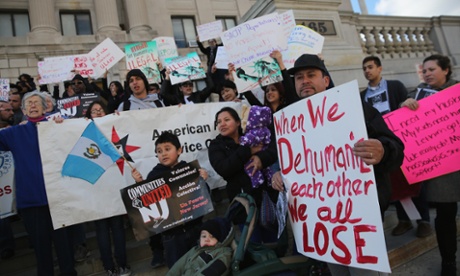
The White House has defended a four-fold increase in the deportation of undocumented immigrants for minor crimes such as driving offences, insisting it is simply complying with “administration priorities” by removing foreign law-breakers from the country.
Campaigners leaped on the new data, obtained under Freedom of Information Act requests by the New York Times, as evidence the Obama administration has stepped up deportations to convince Republicans it can be trusted to enact wider immigration reform.
But with congressional reform efforts stalled, activists are now planning to target their protests against the administration instead, saying it has made matters worse by trying to appease Republican opponents.
“The irony is that this was tactic that Obama and his administration used to show they were tough on immigration and enforcement but somewhere along the line they seem to have lost track of the very reason why they moved so aggressively,” Kica Matos, director of immigrant rights at the Center for Community Change, told the Guardian.
“They focused only on enforcement and did not devote anywhere near the same amount of energy to advancing comprehensive immigration reform legislation as they did to, say, healthcare reform.”
The New York Times investigation found two-thirds of the nearly two million deportation cases it studied involved people who had committed minor infractions or had no criminal record.
The number of cases relating to people whose most serious offence was a traffic violation has quadrupled, rising from 43,000 over the last five years of George W Bush's presidency to 193,000 since Obama took office.
The White House insisted on Monday that its Immigration and Customs Enforcement (ICE) division was mostly complying with guidelines requiring laws to be broken before undocumented immigrants are deported.
“Ninety-eight percent of ICE's total removals last year met one more of the agency's civil immigration enforcement priorities,” said spokesman Jay Carney. “Other than convicted criminals, priorities include those apprehended while attempting to unlawfully enter the United States, illegal re-entry, and fugitives from immigration court.
He said 82% of those removed from the interior of the US were previously convicted of a criminal offence and 72% were convicted of more serious crimes involving violence or property theft.
However Carney acknowledged that the one of the challenges of such guidelines is that anyone caught attempting to re-enter after being removed is automatically guilty of a felony, a more serious class of crime.
Ninety-three percent of all ICE's non-criminal removals were recent border crossers, repeated immigration violators or fugitives from immigration court, he said.
Campaigners argue that such rules rip hundreds of thousands of American families apart, since many undocumented immigrants have been settled in the US for decades and have family dependents who are left devastated by something as minor as running a red light.
“They are trying to find a way to mitigate the horror of what Obama has done over the last eight years,” said Matos, who accused the White House of “playing a public relations game”.
“You can bet your bottom dollar that we are well on the way to escalating [our protest campaign],” she added. “Last year we included civil disobedience. The biggest difference this year is that our protests are targeted more and more at the Obama administration.”
Two weeks ago, the White House announced a review of deportation practices by Homeland Security director Jeh Johnson and has asked campaigners to hold off from public criticism and give it 90 more days to try to convince Republicans in the House of Representatives of the need for wider immigration reform.

The White House has defended a four-fold increase in the deportation of undocumented immigrants for minor crimes such as driving offences, insisting it is simply complying with “administration priorities” by removing foreign law-breakers from the country.
Campaigners leaped on the new data, obtained under Freedom of Information Act requests by the New York Times, as evidence the Obama administration has stepped up deportations to convince Republicans it can be trusted to enact wider immigration reform.
But with congressional reform efforts stalled, activists are now planning to target their protests against the administration instead, saying it has made matters worse by trying to appease Republican opponents.
“The irony is that this was tactic that Obama and his administration used to show they were tough on immigration and enforcement but somewhere along the line they seem to have lost track of the very reason why they moved so aggressively,” Kica Matos, director of immigrant rights at the Center for Community Change, told the Guardian.
“They focused only on enforcement and did not devote anywhere near the same amount of energy to advancing comprehensive immigration reform legislation as they did to, say, healthcare reform.”
The New York Times investigation found two-thirds of the nearly two million deportation cases it studied involved people who had committed minor infractions or had no criminal record.
The number of cases relating to people whose most serious offence was a traffic violation has quadrupled, rising from 43,000 over the last five years of George W Bush's presidency to 193,000 since Obama took office.
The White House insisted on Monday that its Immigration and Customs Enforcement (ICE) division was mostly complying with guidelines requiring laws to be broken before undocumented immigrants are deported.
“Ninety-eight percent of ICE's total removals last year met one more of the agency's civil immigration enforcement priorities,” said spokesman Jay Carney. “Other than convicted criminals, priorities include those apprehended while attempting to unlawfully enter the United States, illegal re-entry, and fugitives from immigration court.
He said 82% of those removed from the interior of the US were previously convicted of a criminal offence and 72% were convicted of more serious crimes involving violence or property theft.
However Carney acknowledged that the one of the challenges of such guidelines is that anyone caught attempting to re-enter after being removed is automatically guilty of a felony, a more serious class of crime.
Ninety-three percent of all ICE's non-criminal removals were recent border crossers, repeated immigration violators or fugitives from immigration court, he said.
Campaigners argue that such rules rip hundreds of thousands of American families apart, since many undocumented immigrants have been settled in the US for decades and have family dependents who are left devastated by something as minor as running a red light.
“They are trying to find a way to mitigate the horror of what Obama has done over the last eight years,” said Matos, who accused the White House of “playing a public relations game”.
“You can bet your bottom dollar that we are well on the way to escalating [our protest campaign],” she added. “Last year we included civil disobedience. The biggest difference this year is that our protests are targeted more and more at the Obama administration.”
Two weeks ago, the White House announced a review of deportation practices by Homeland Security director Jeh Johnson and has asked campaigners to hold off from public criticism and give it 90 more days to try to convince Republicans in the House of Representatives of the need for wider immigration reform.

